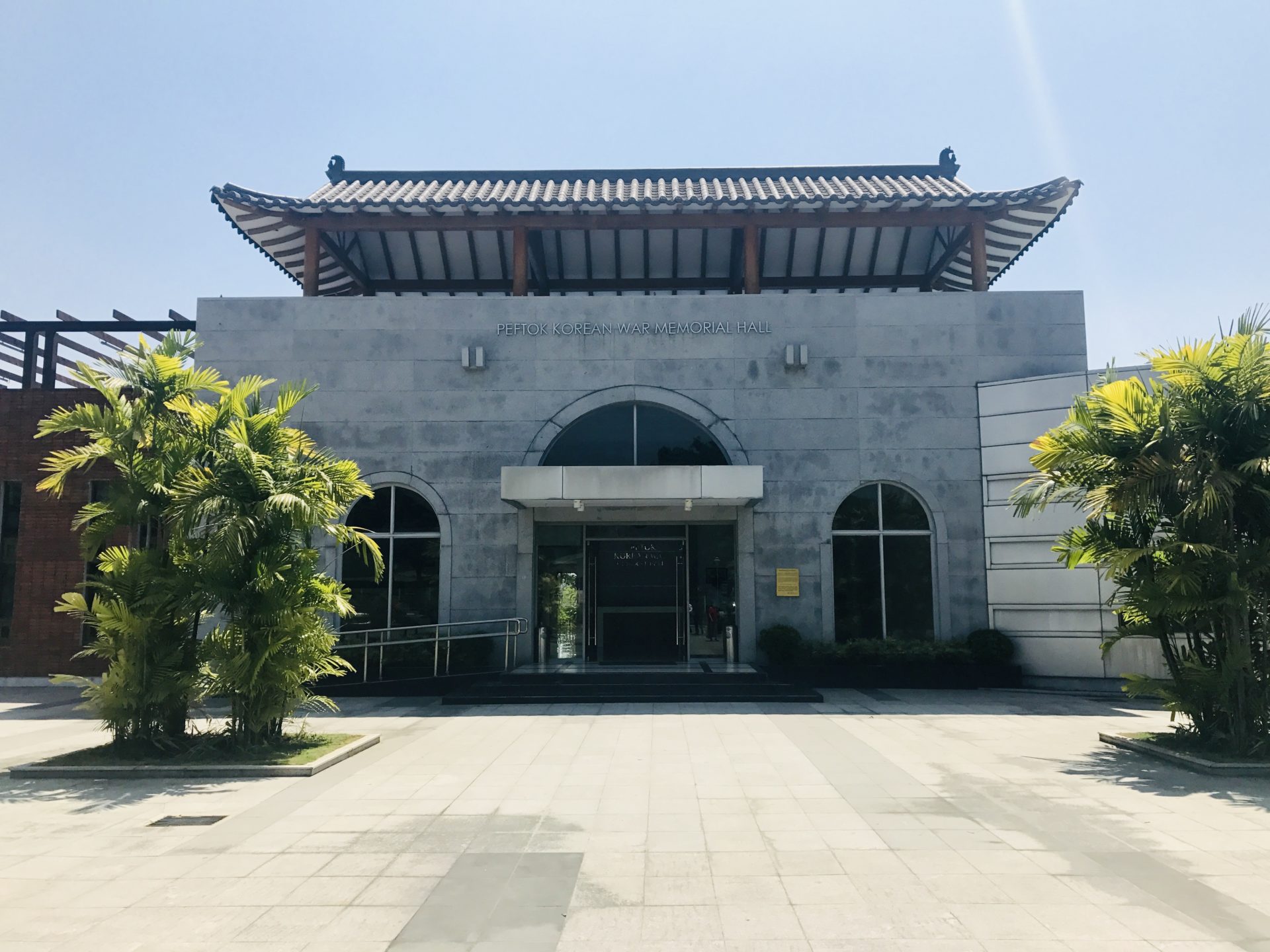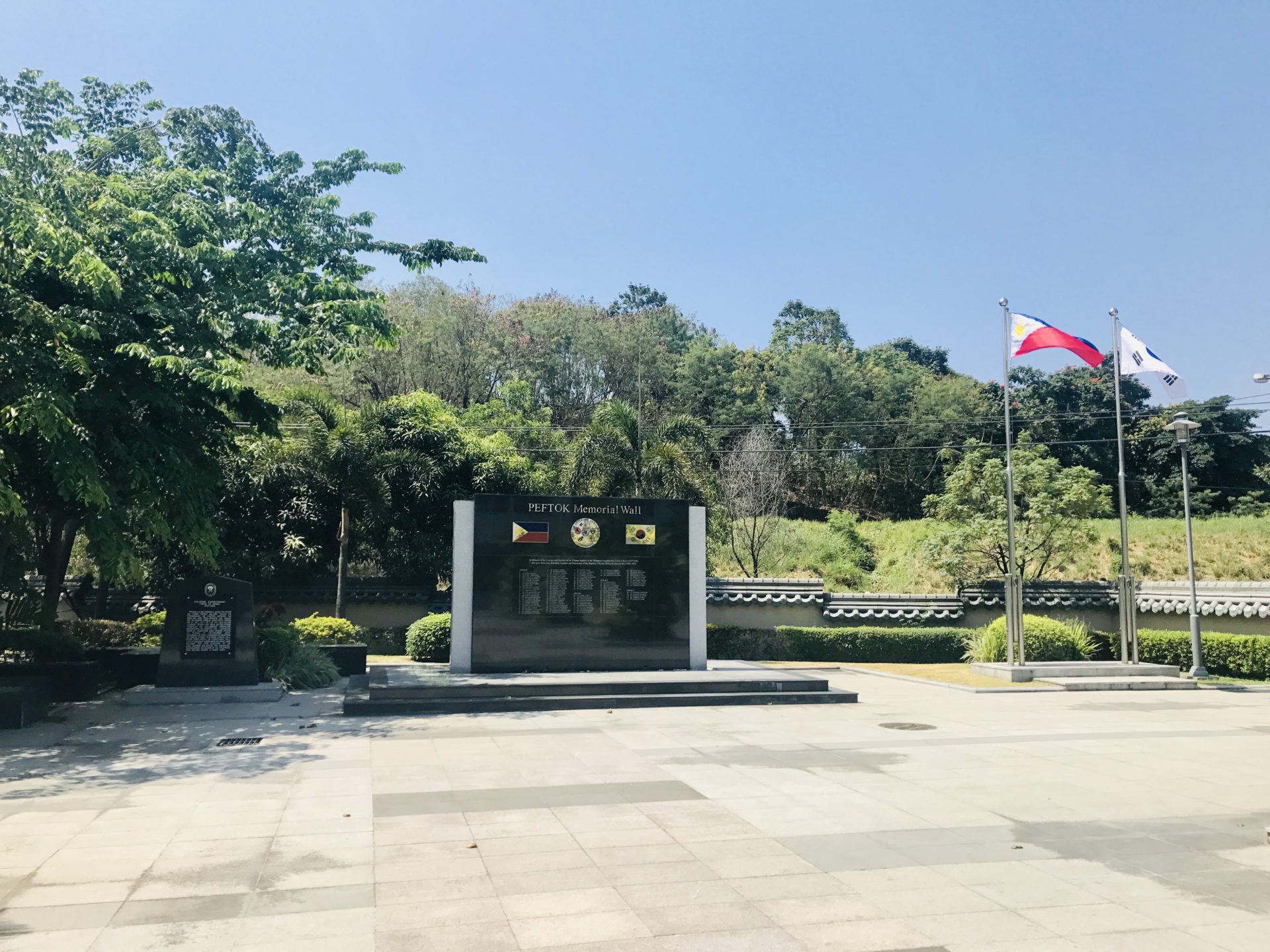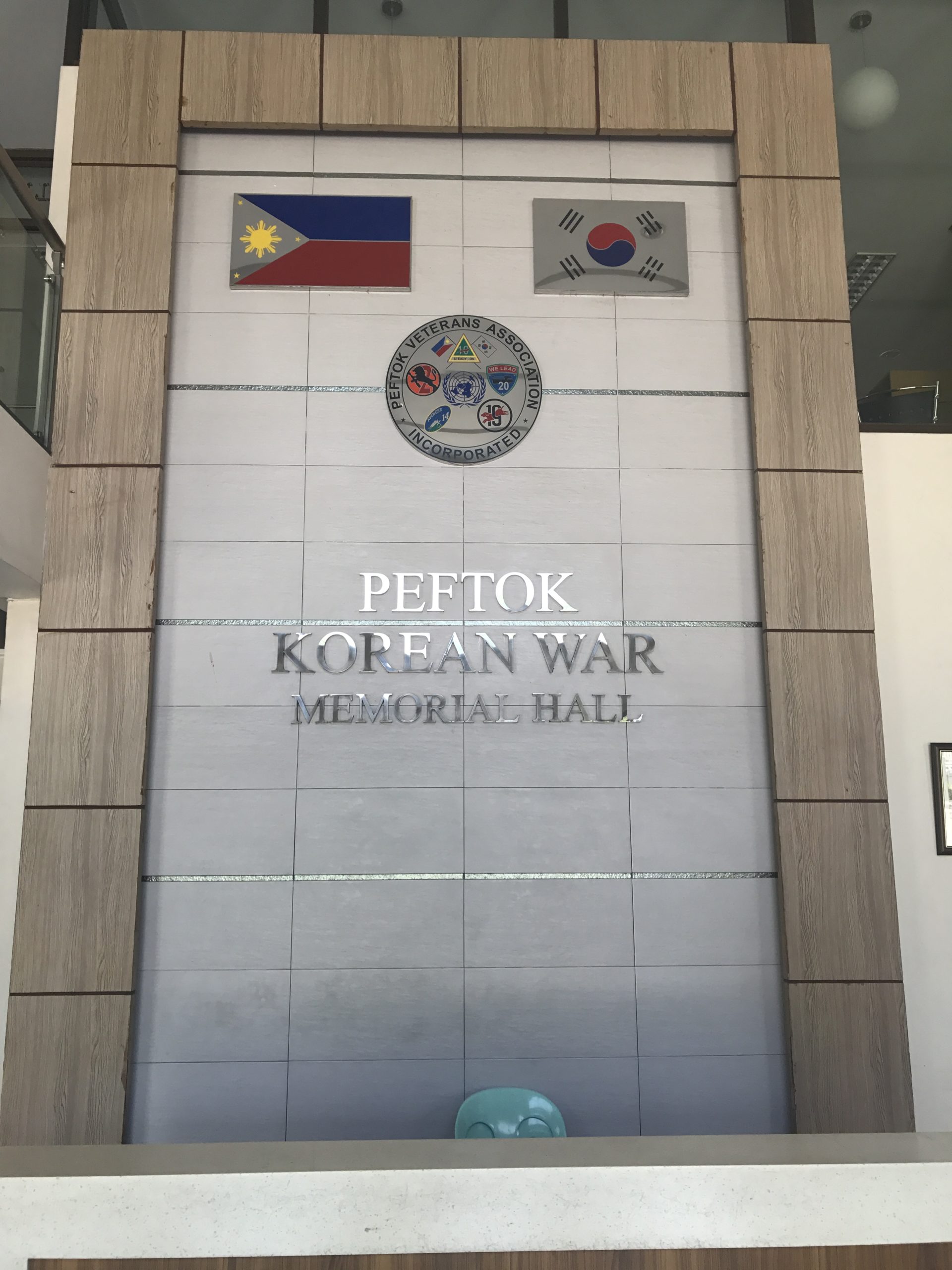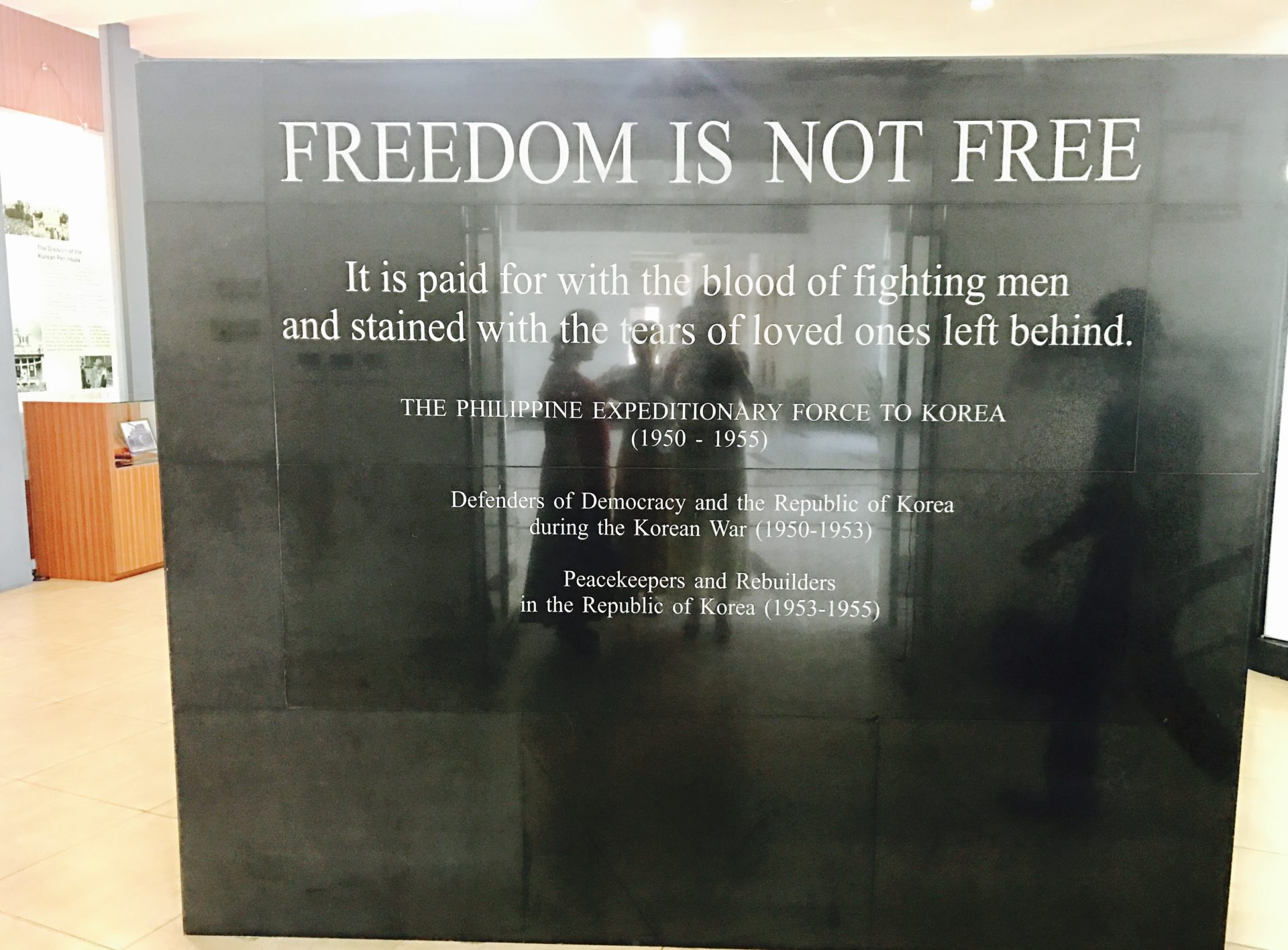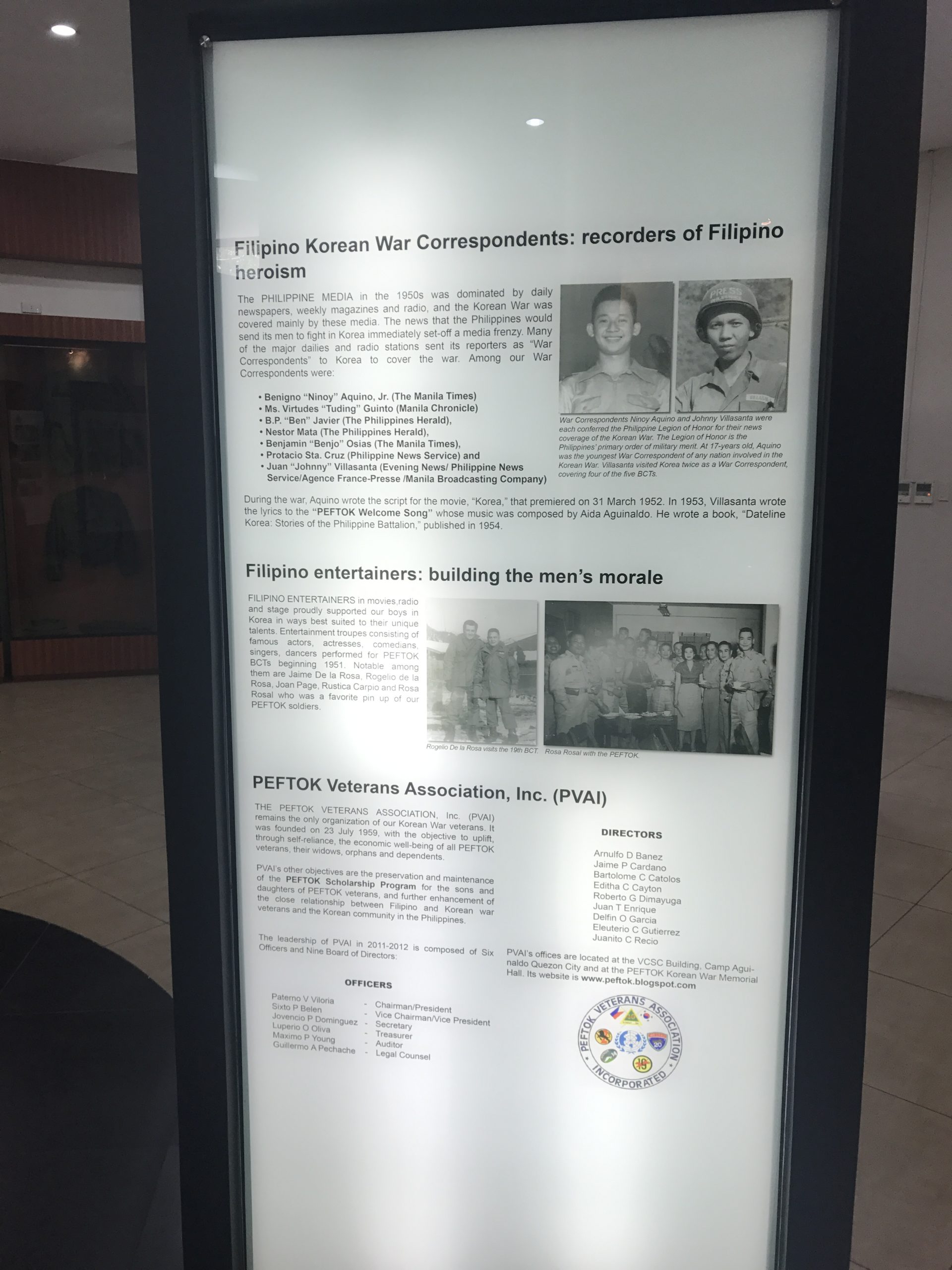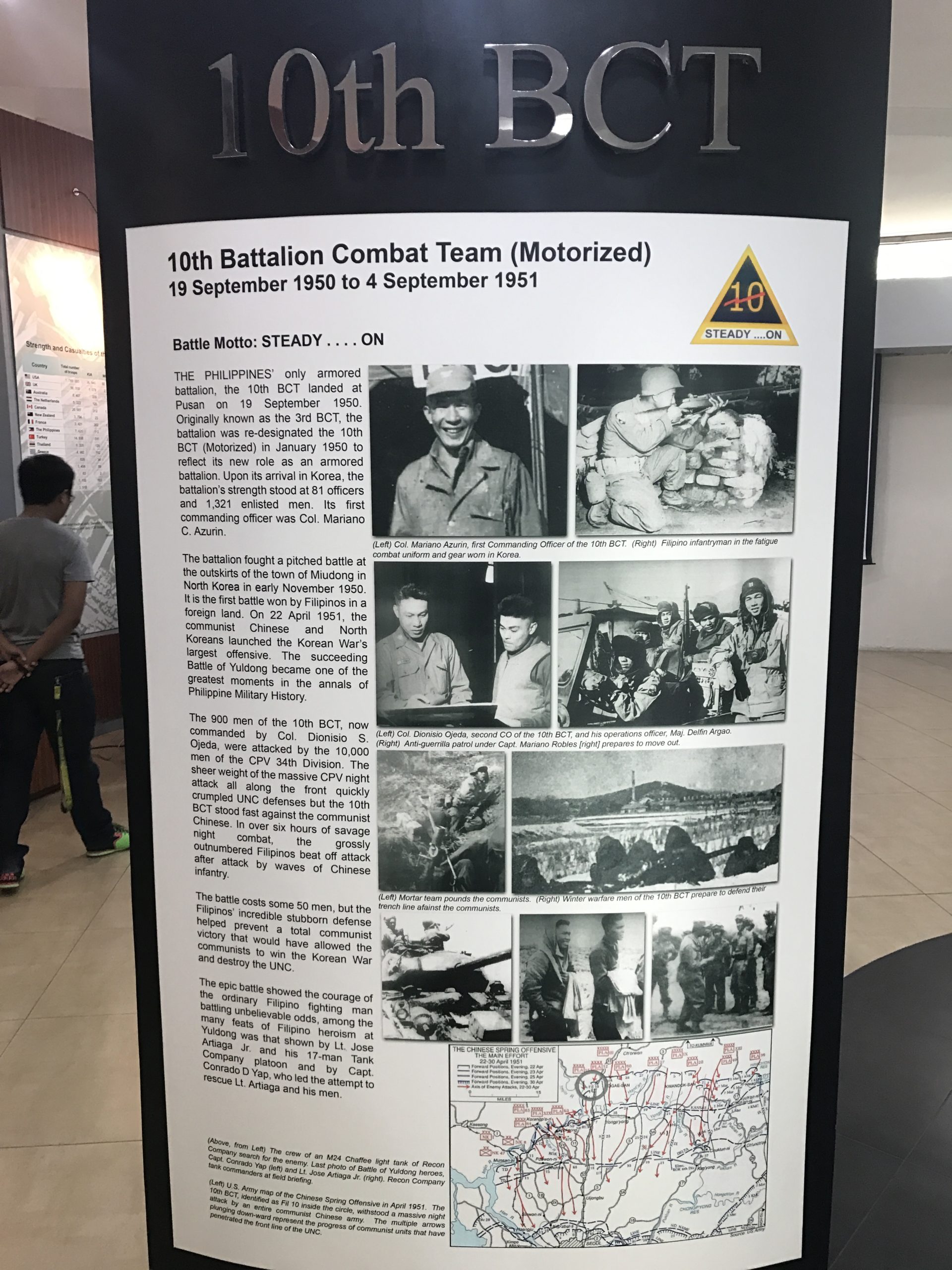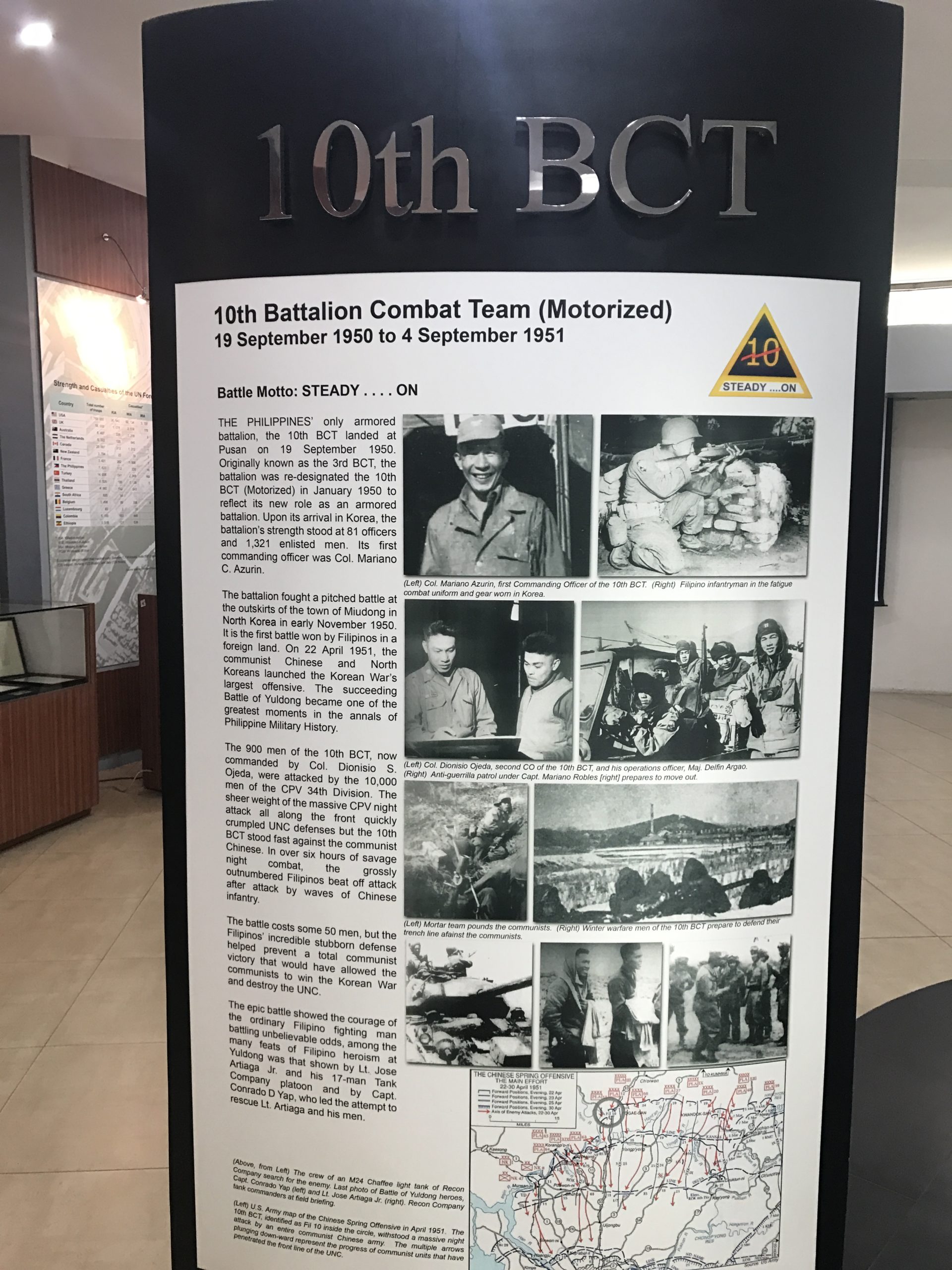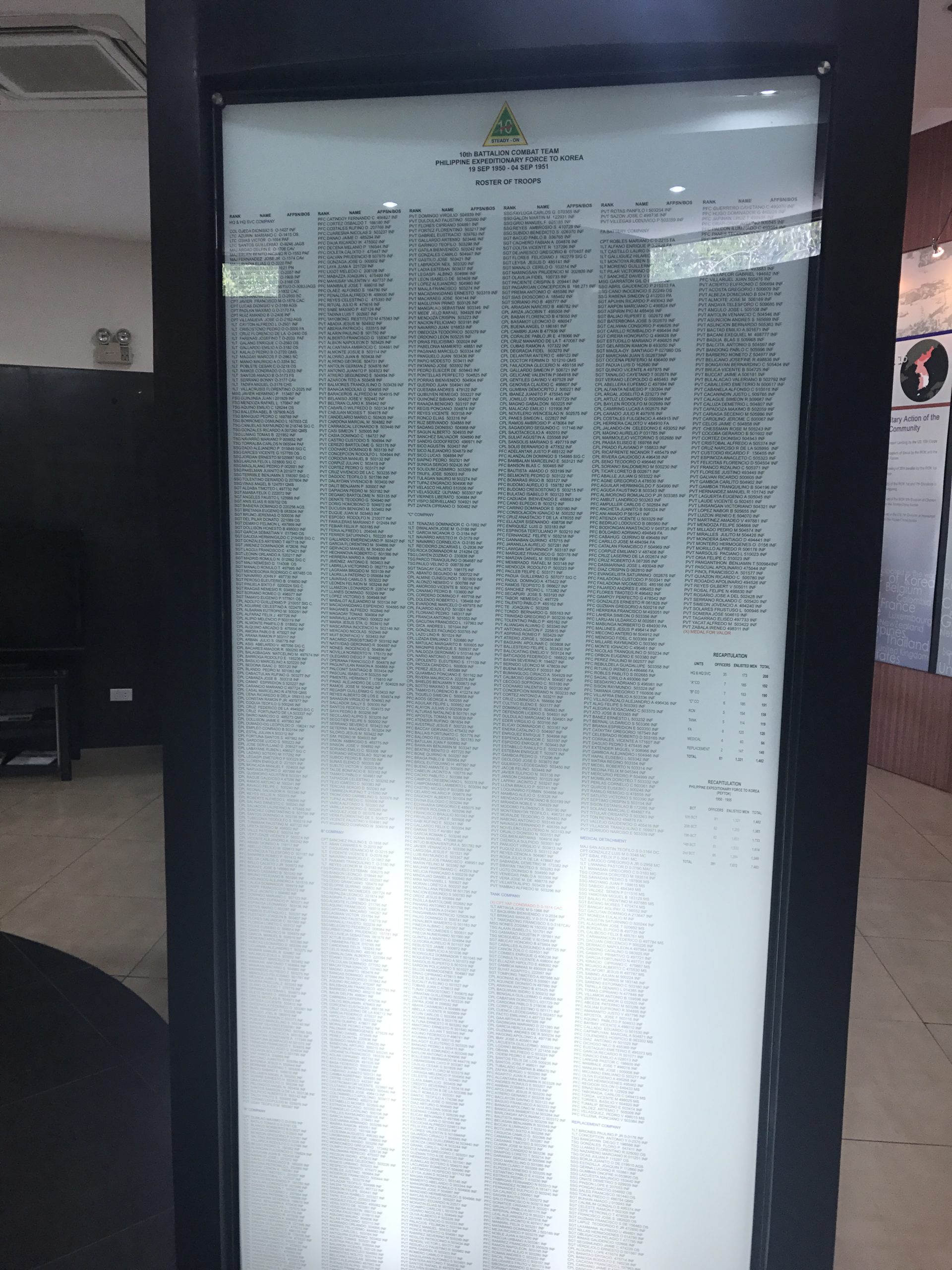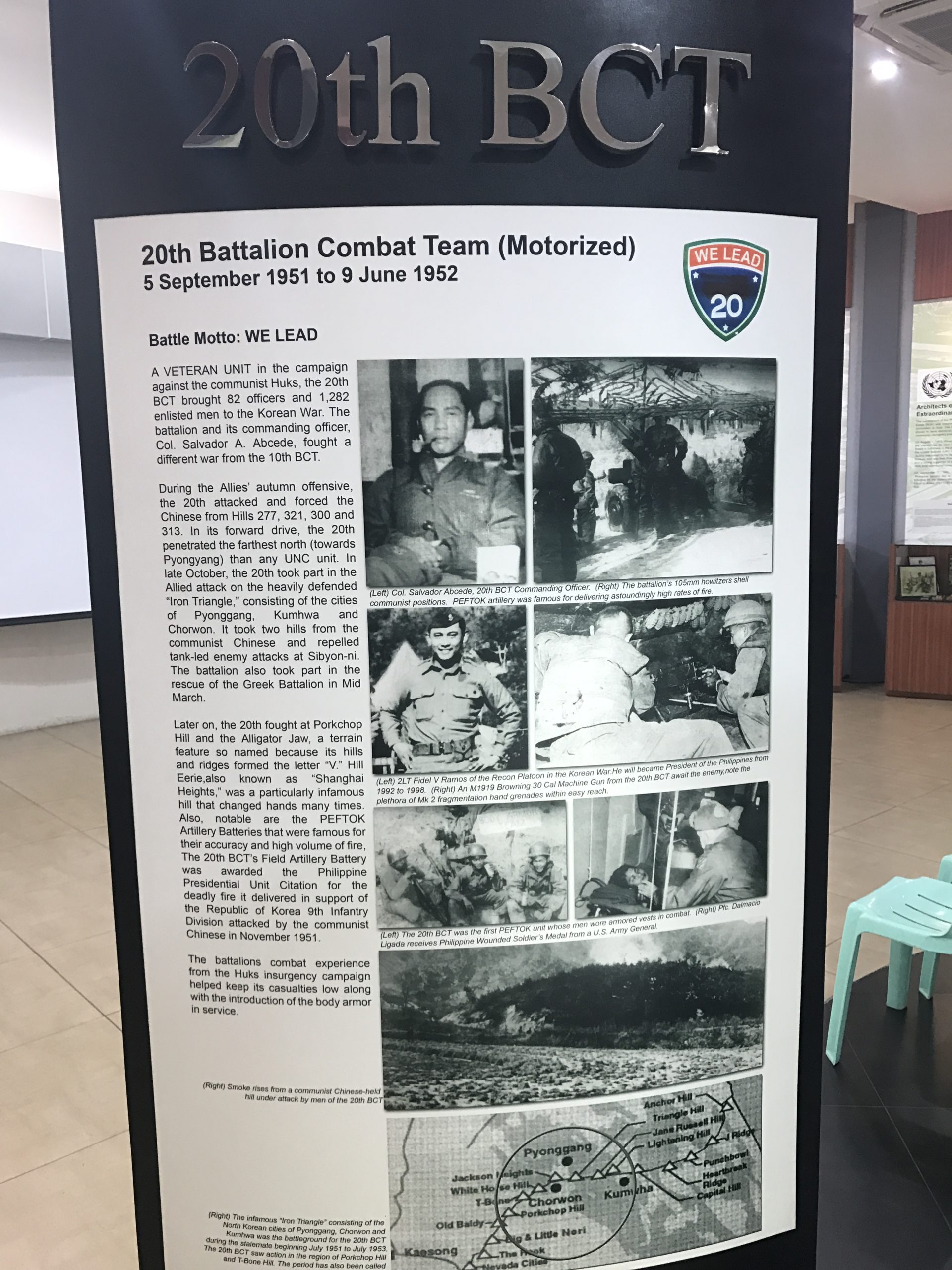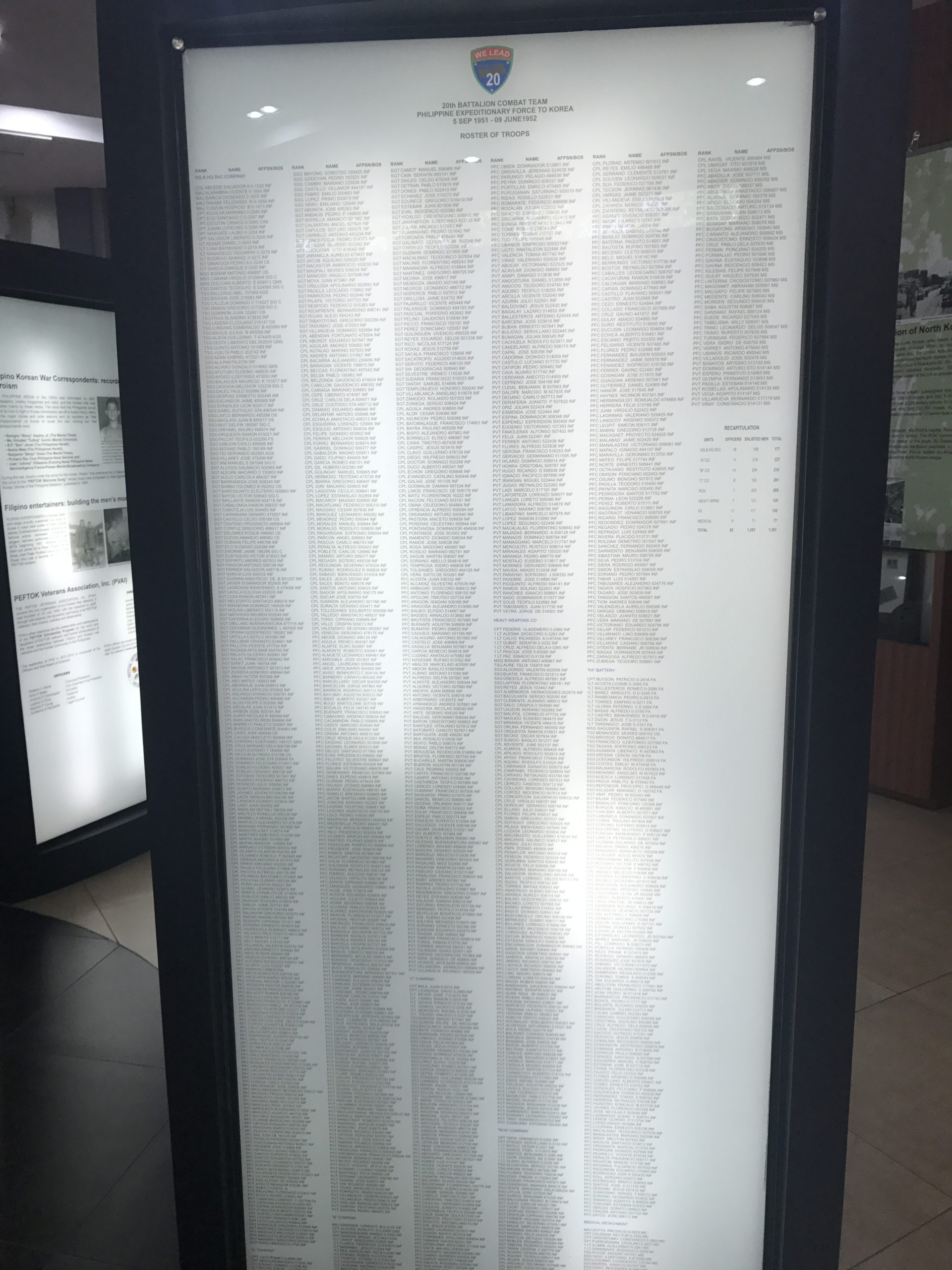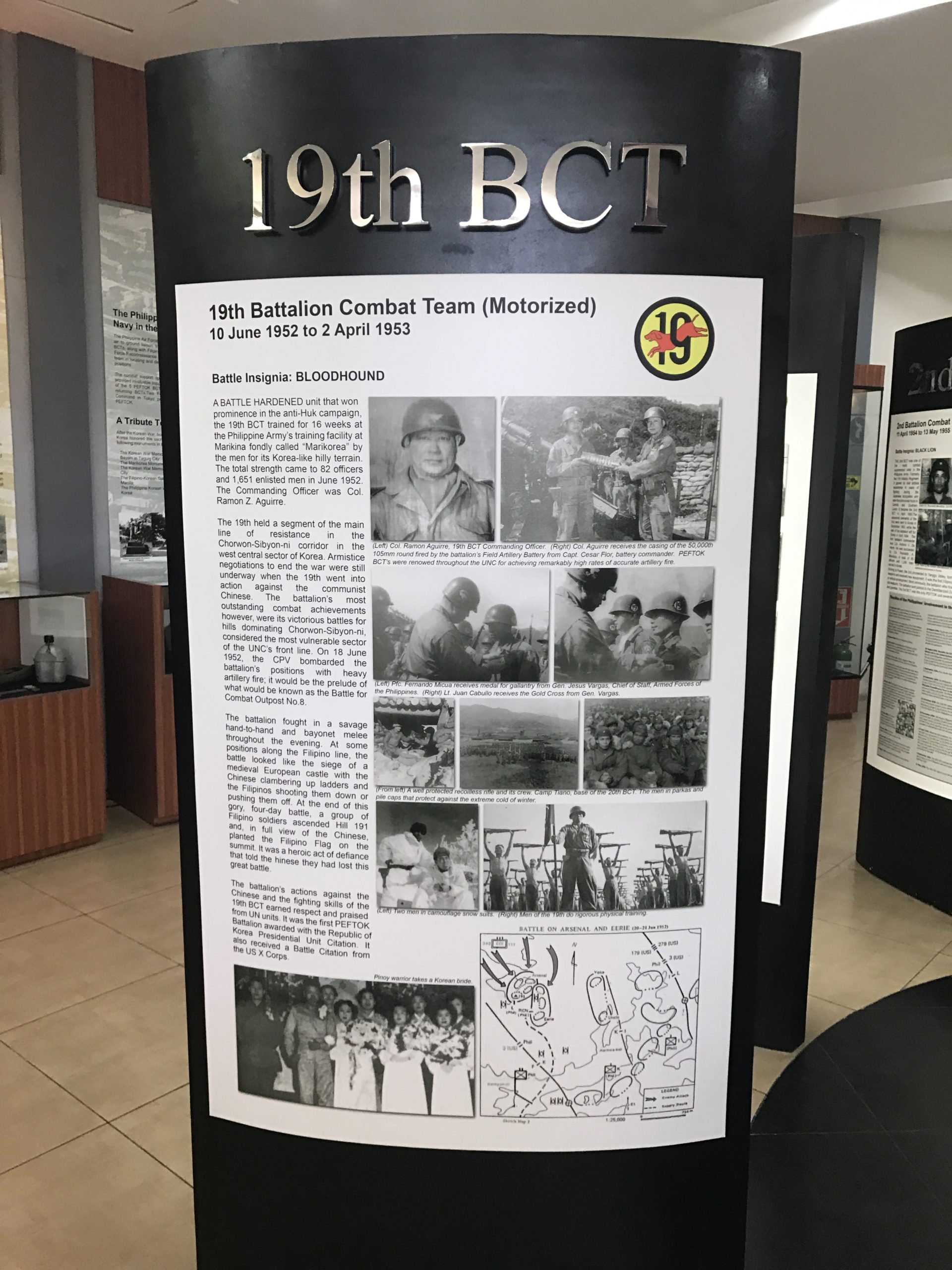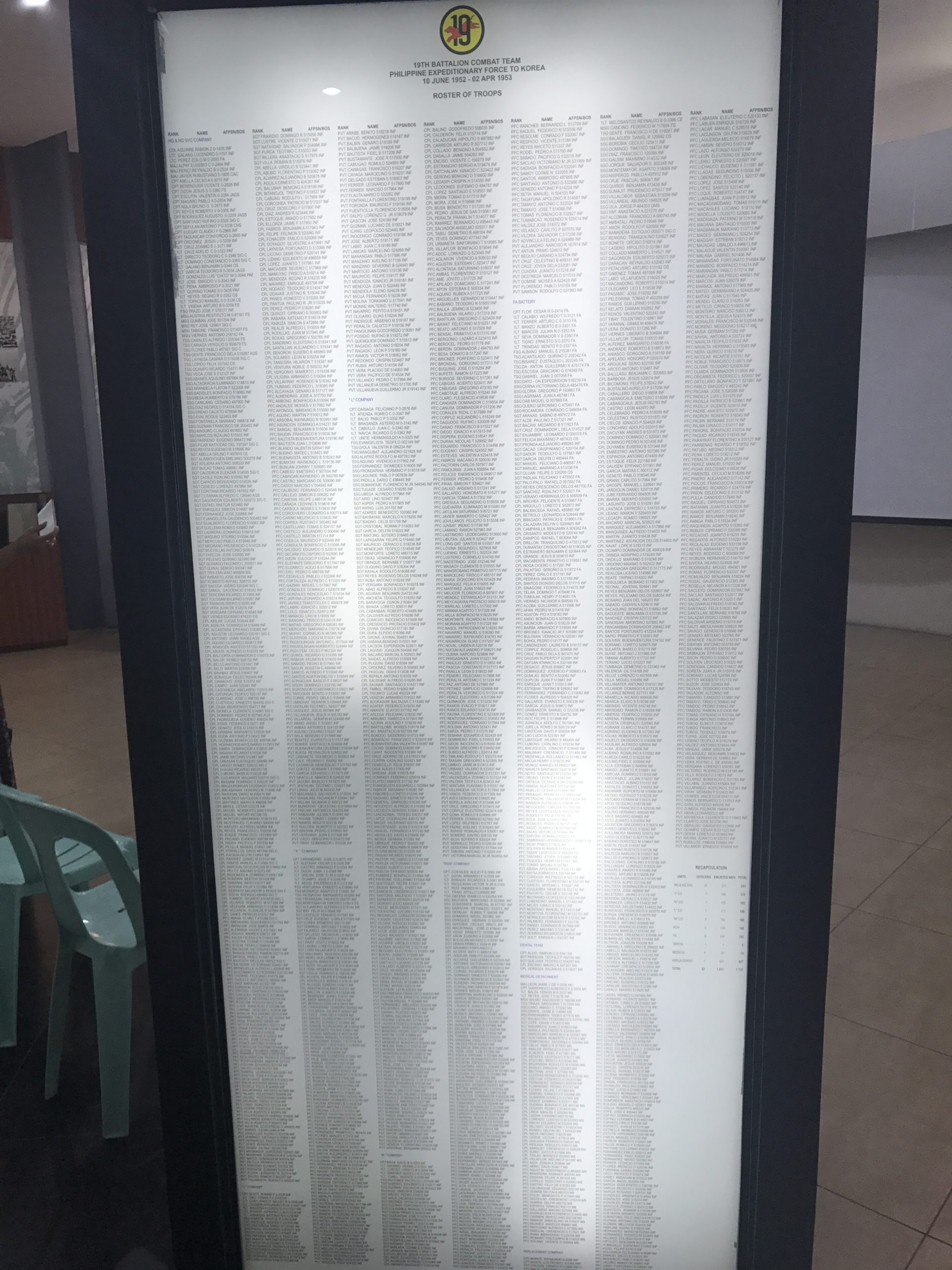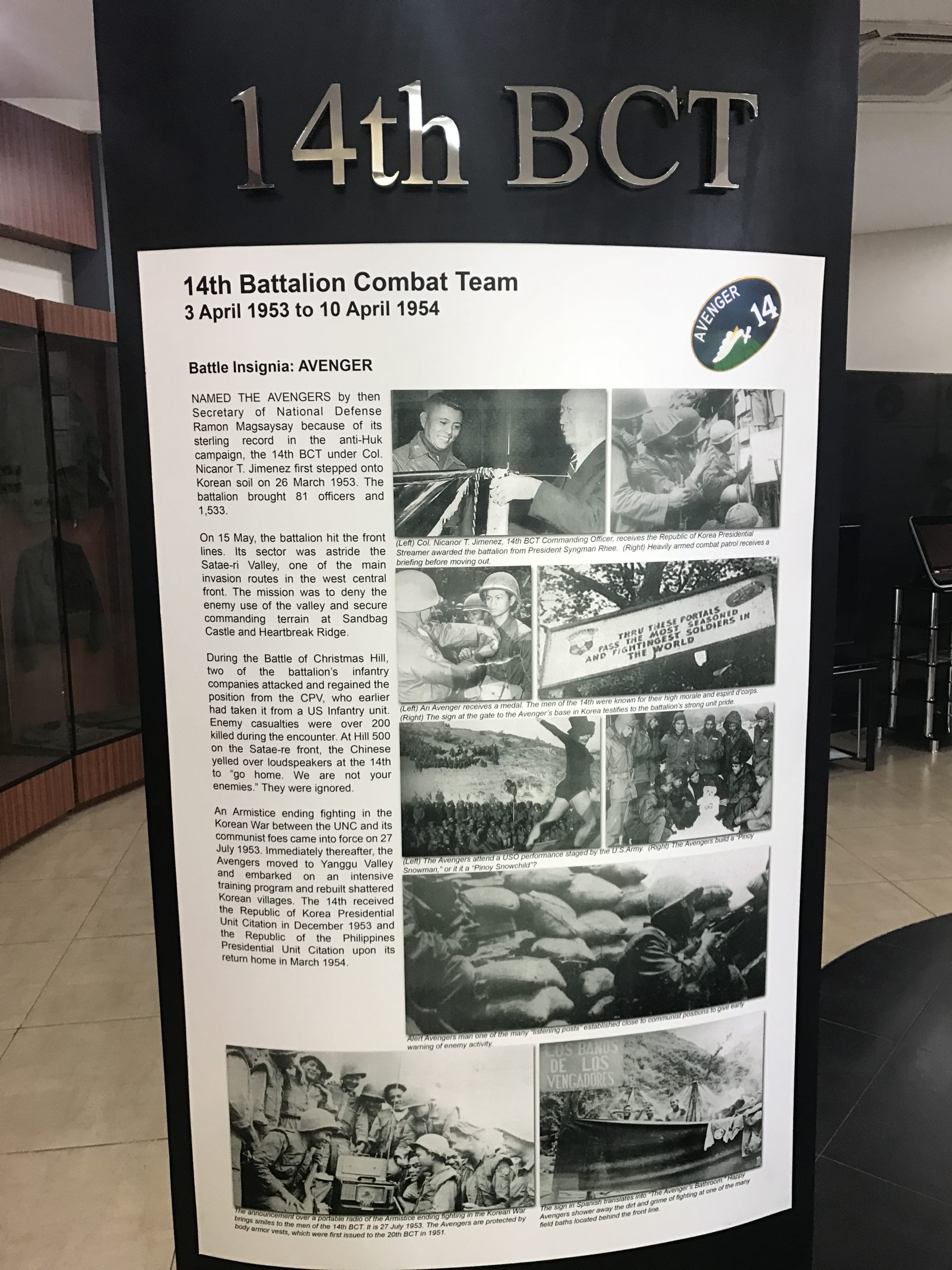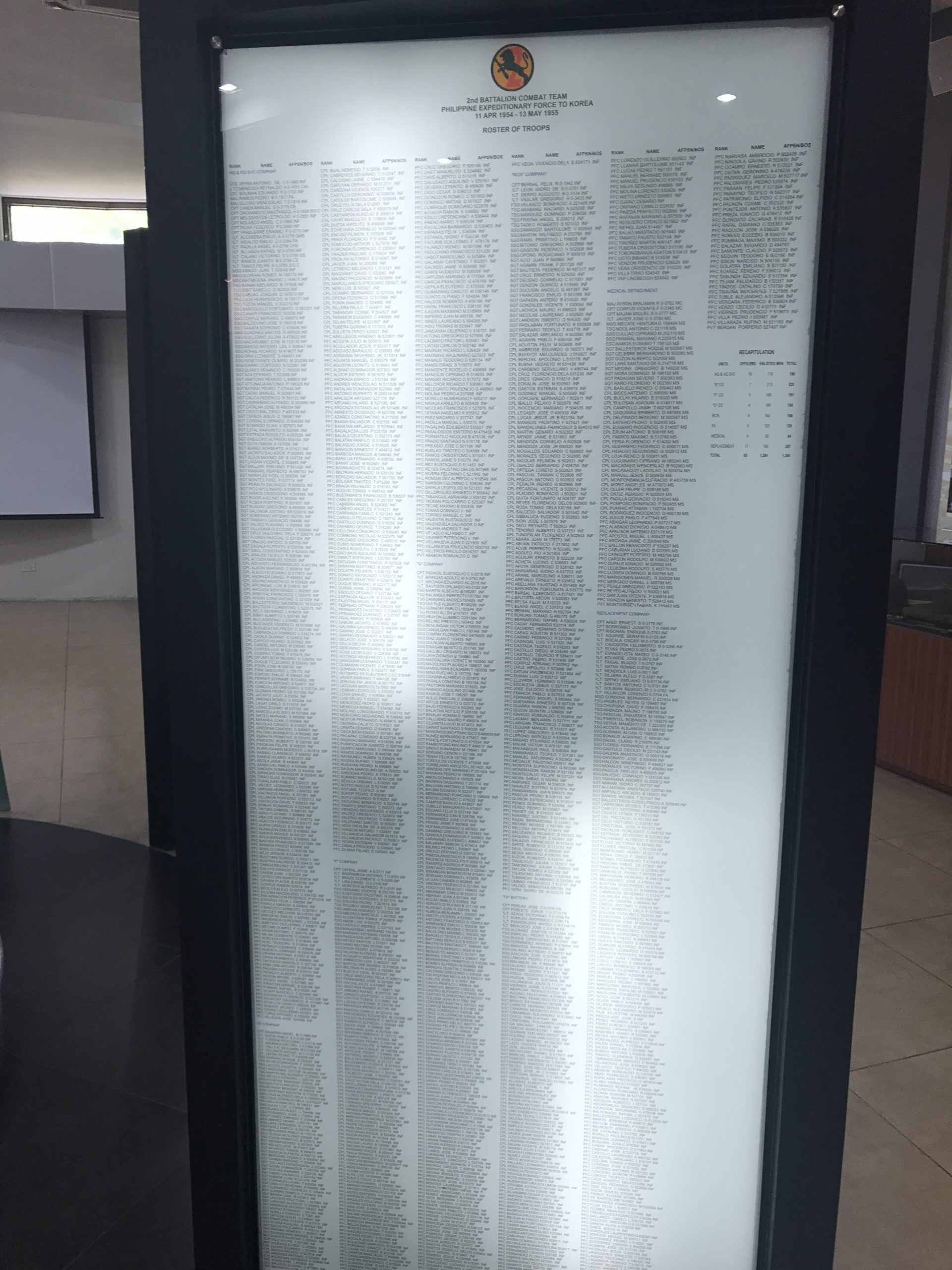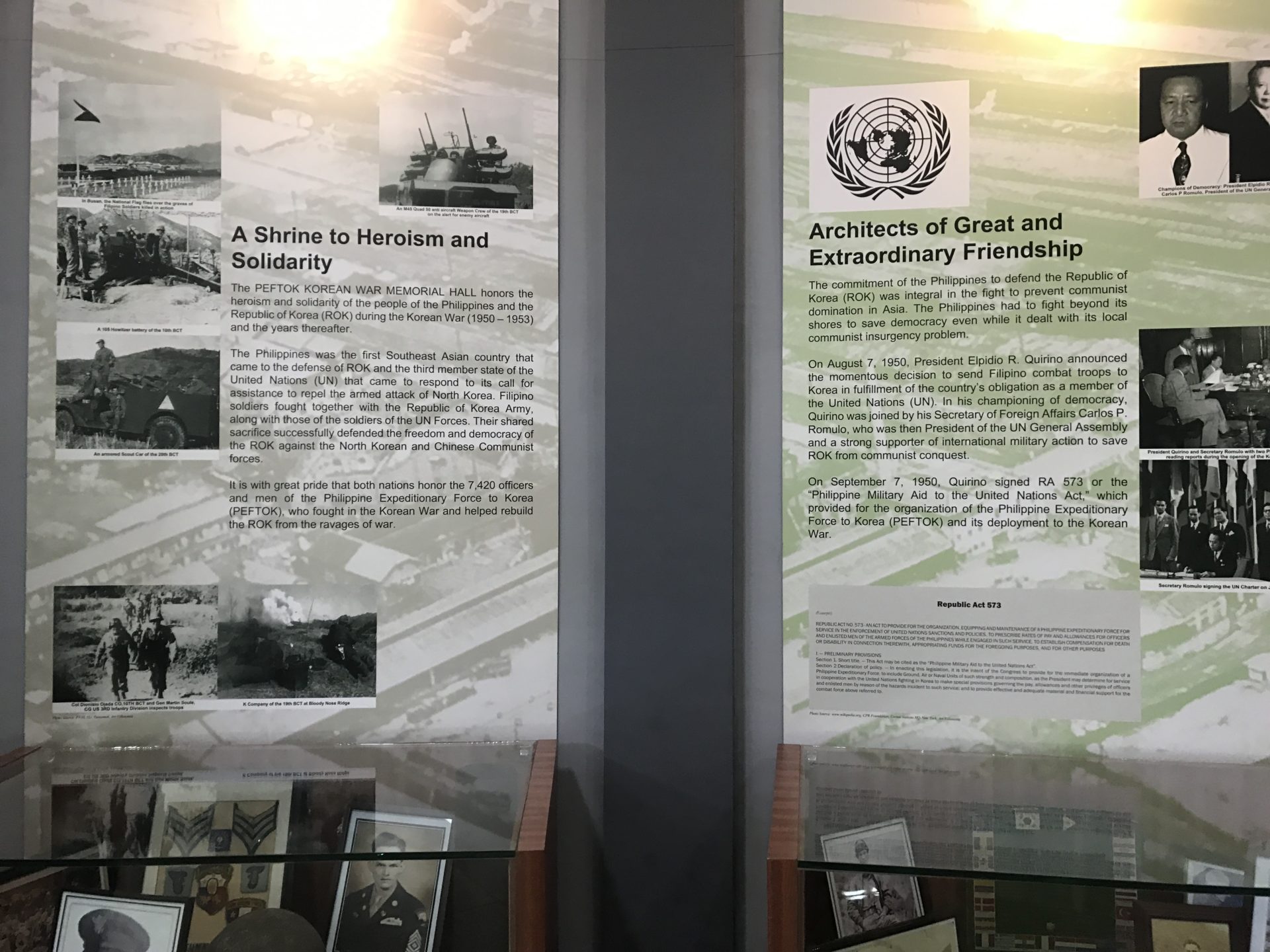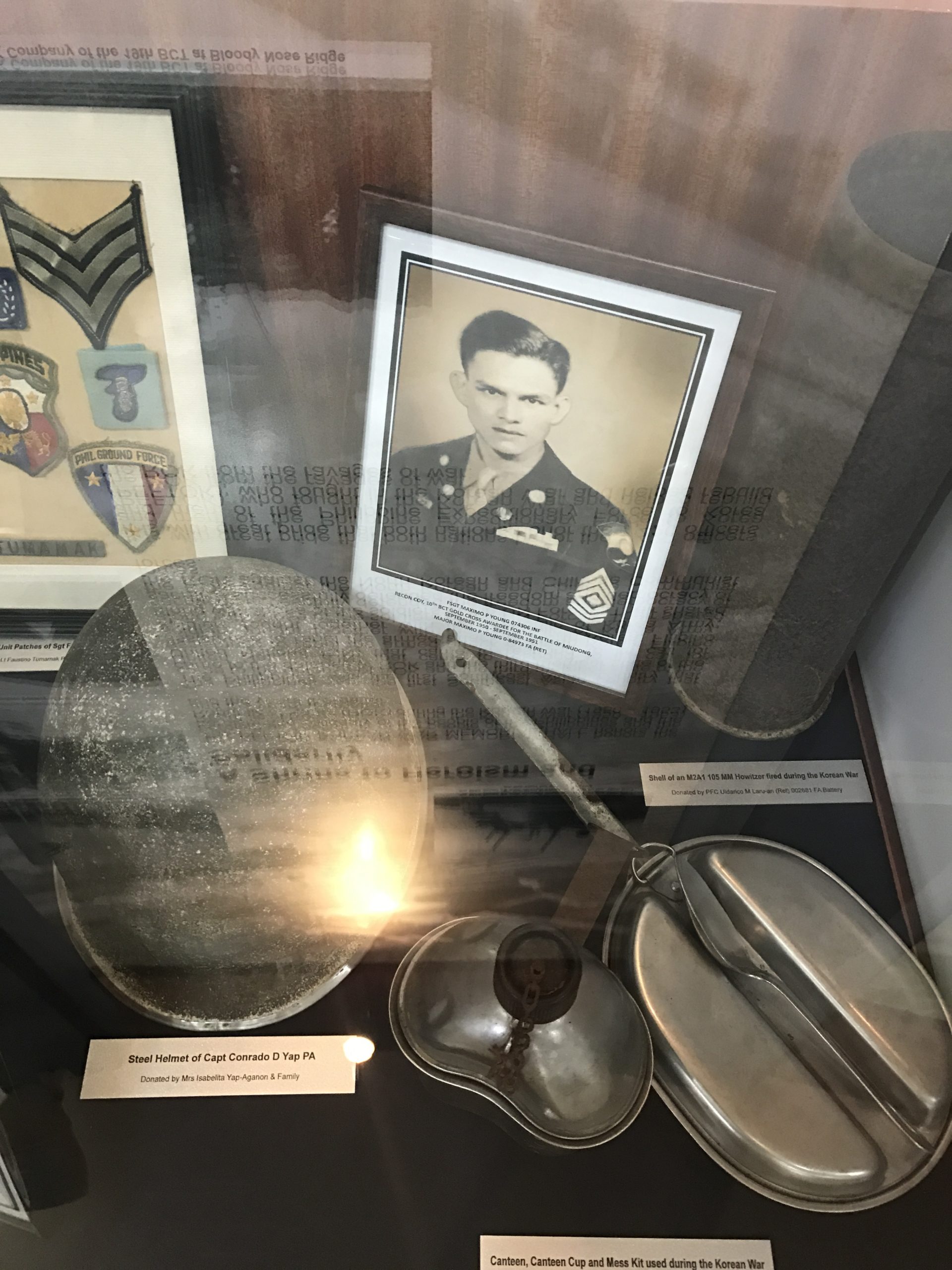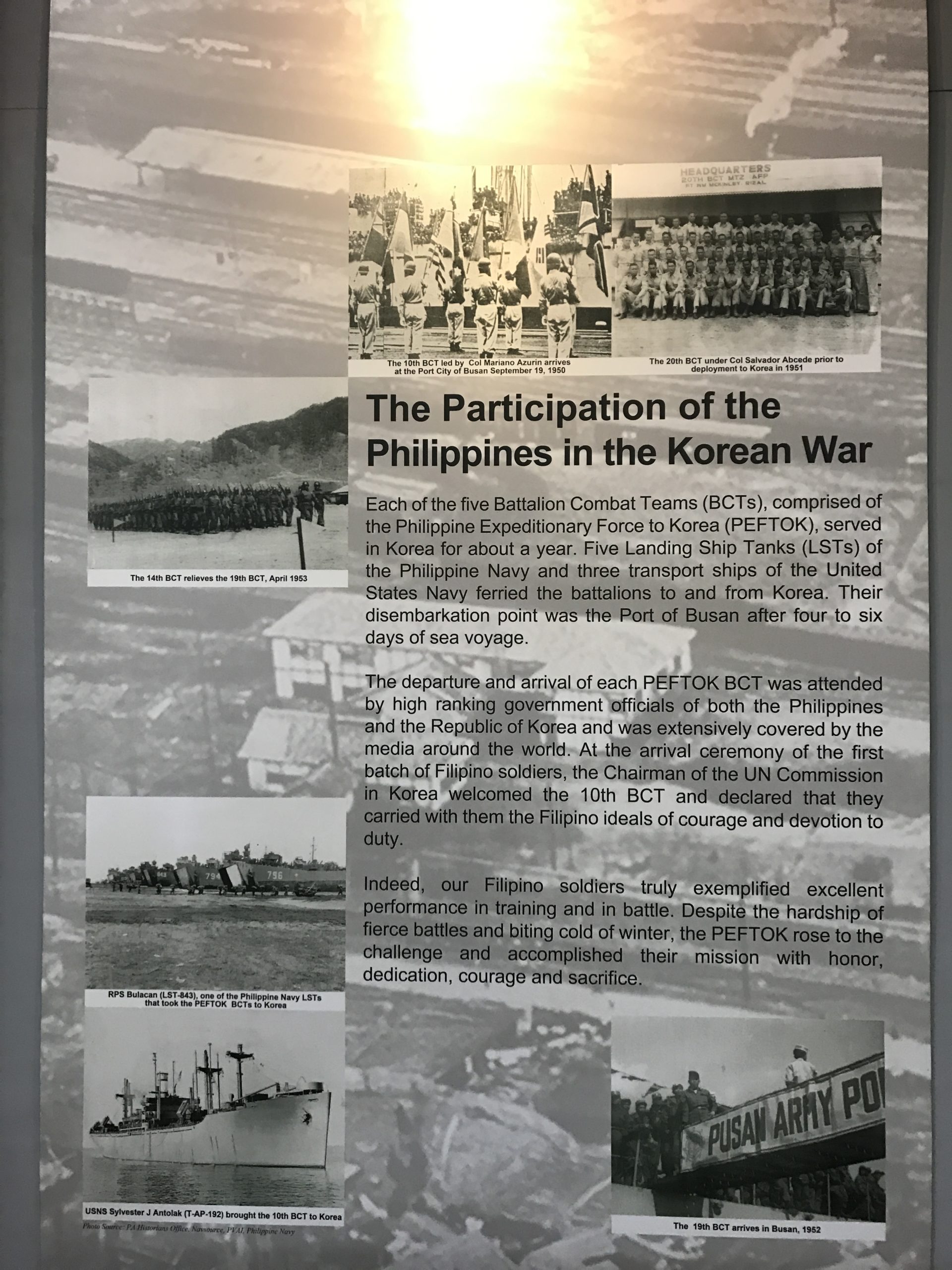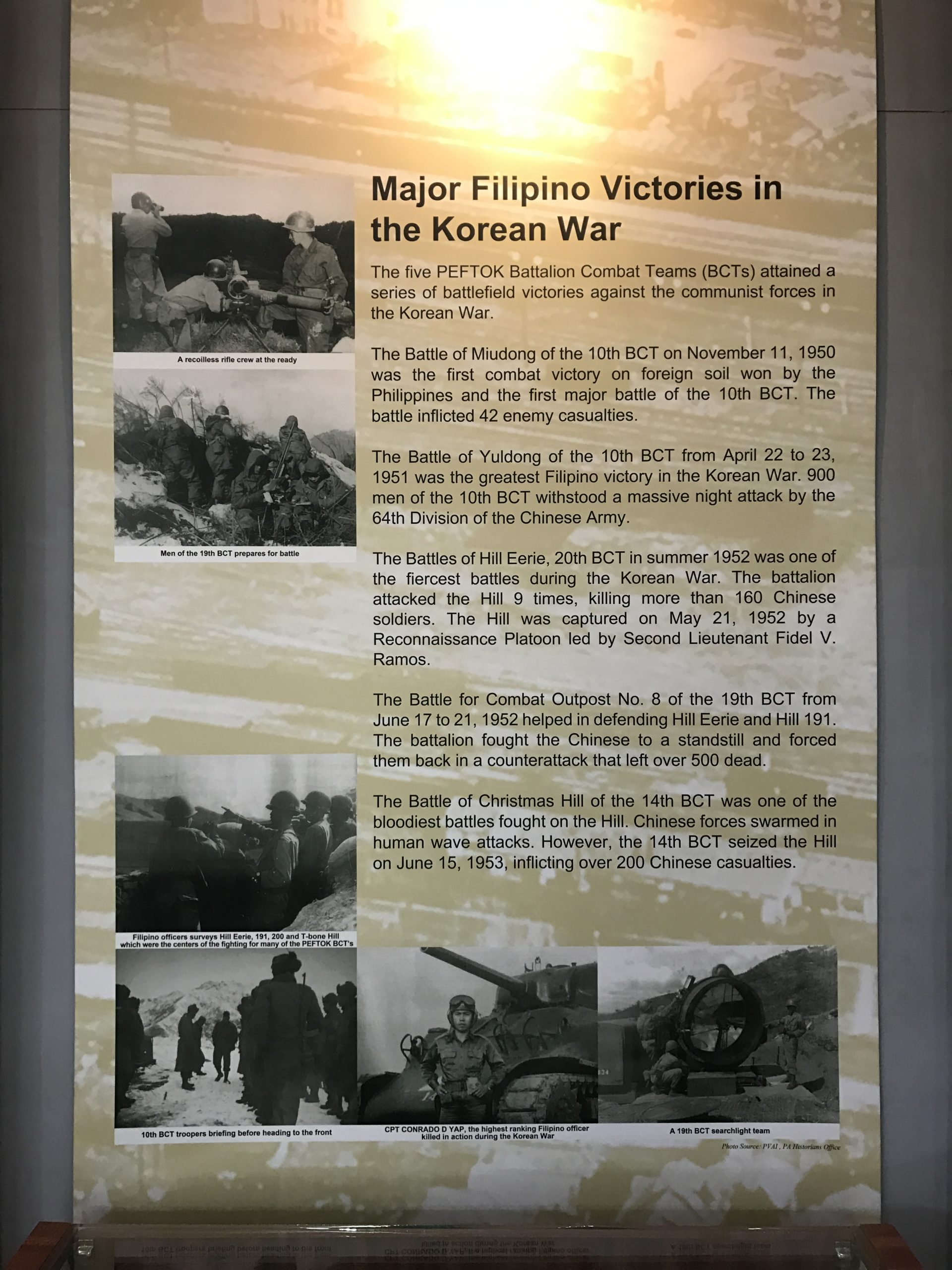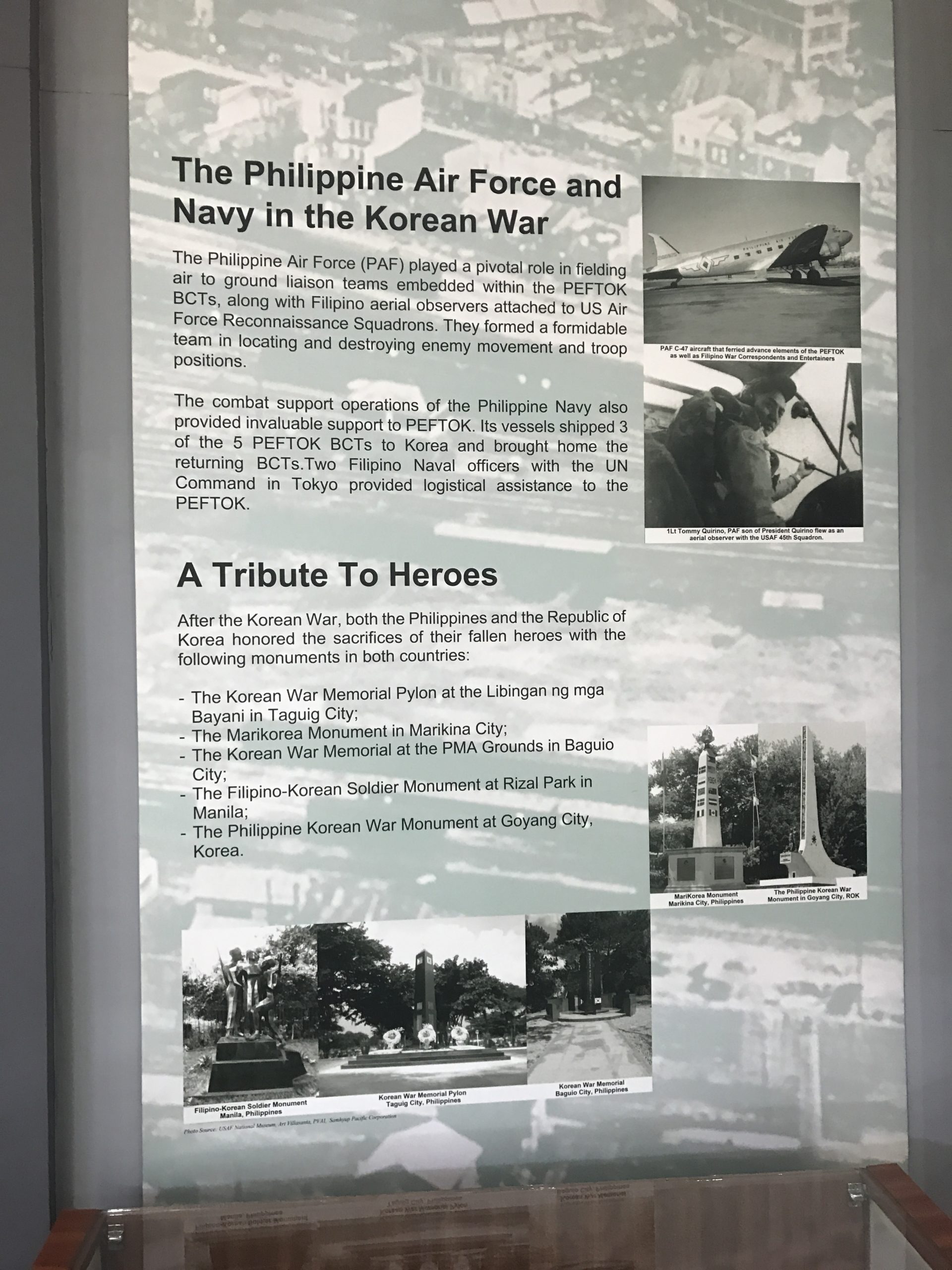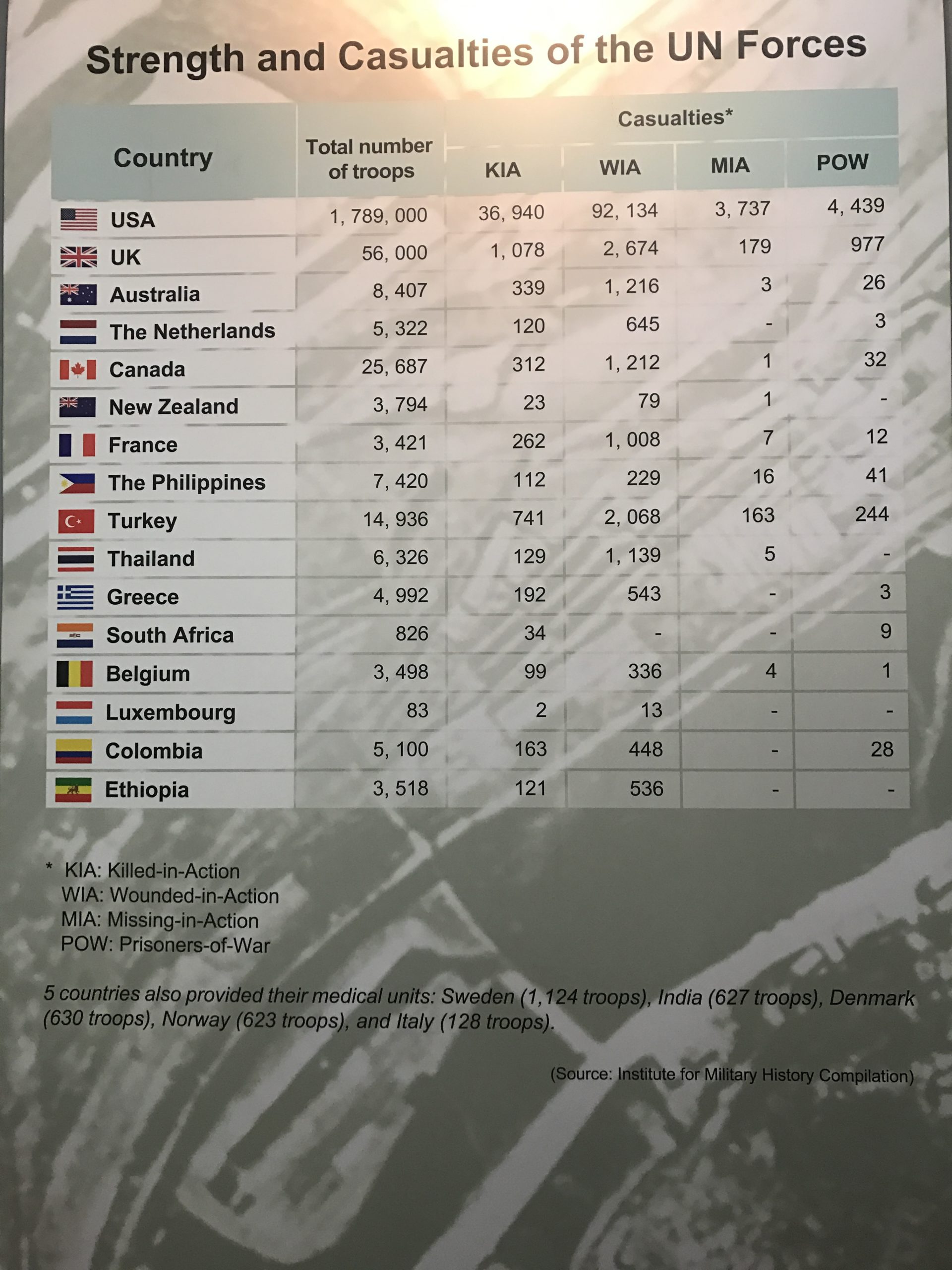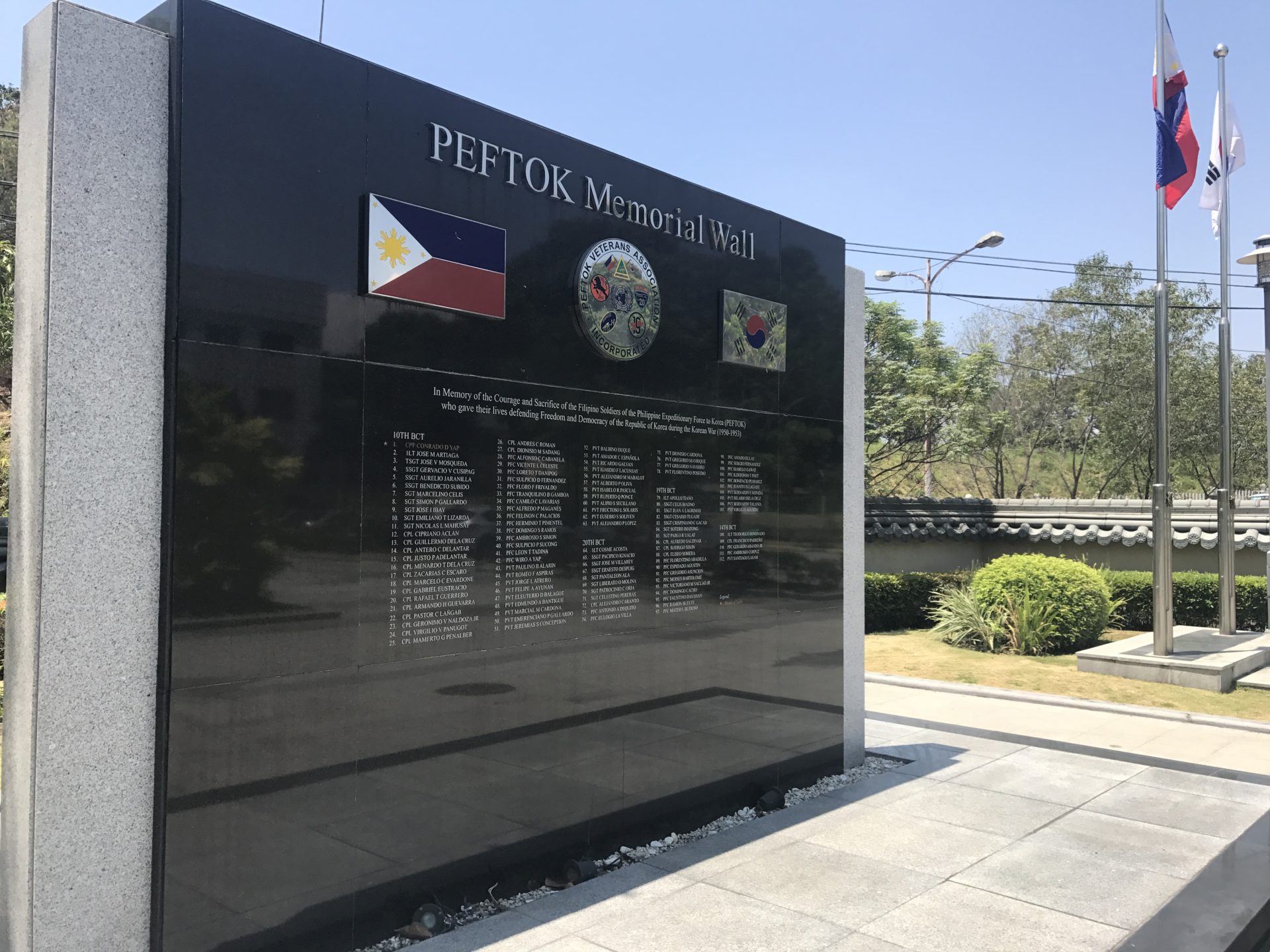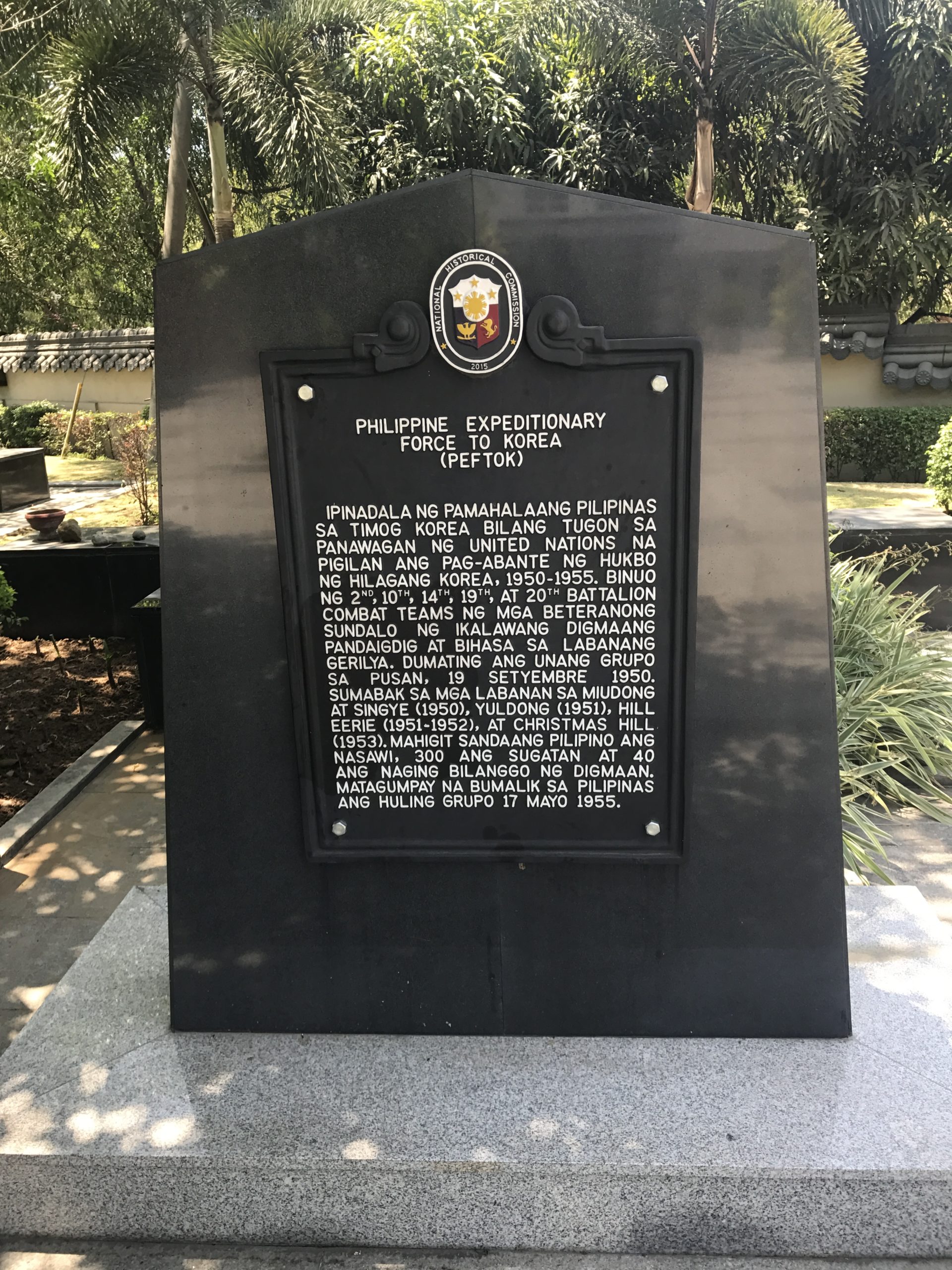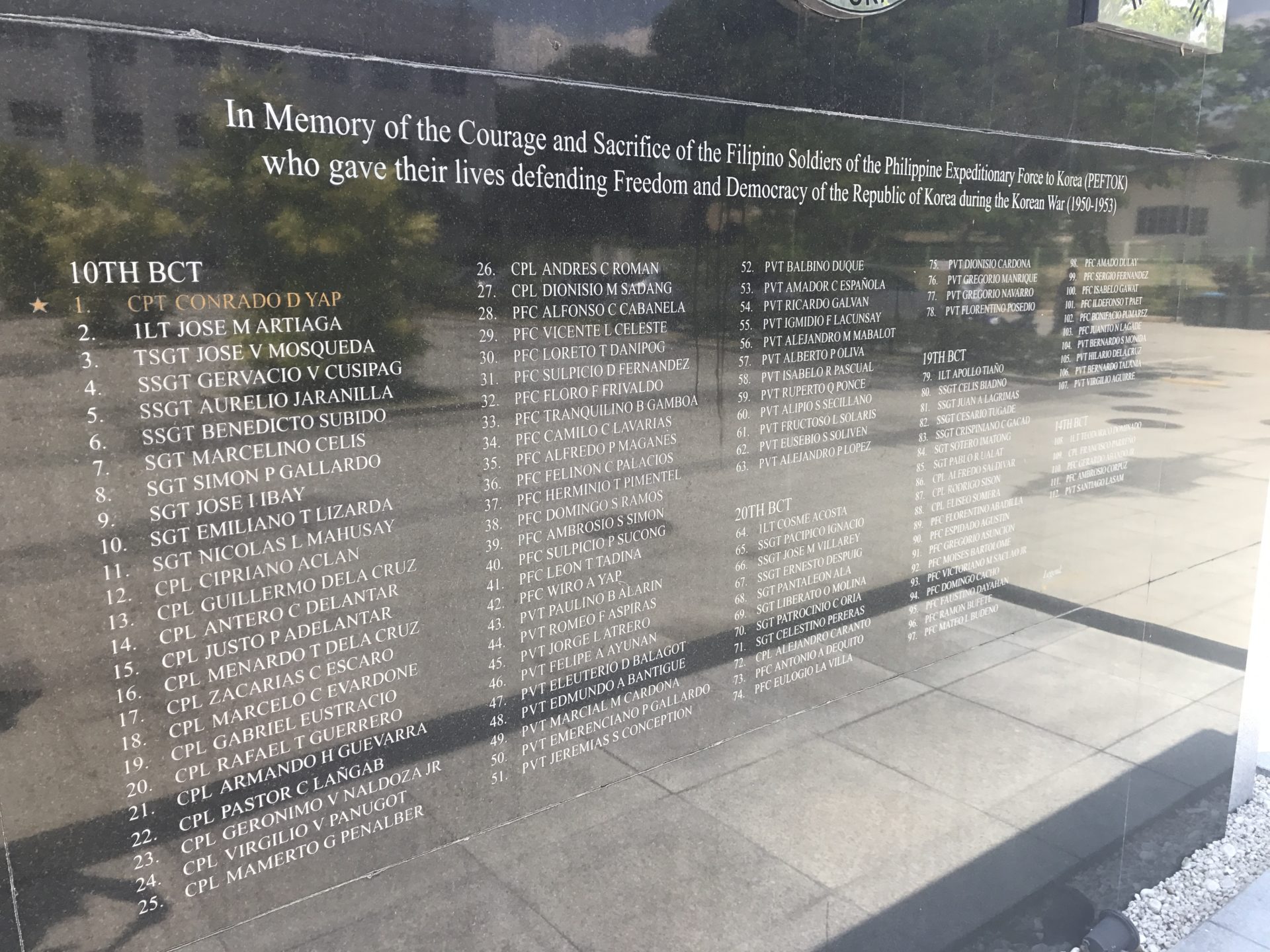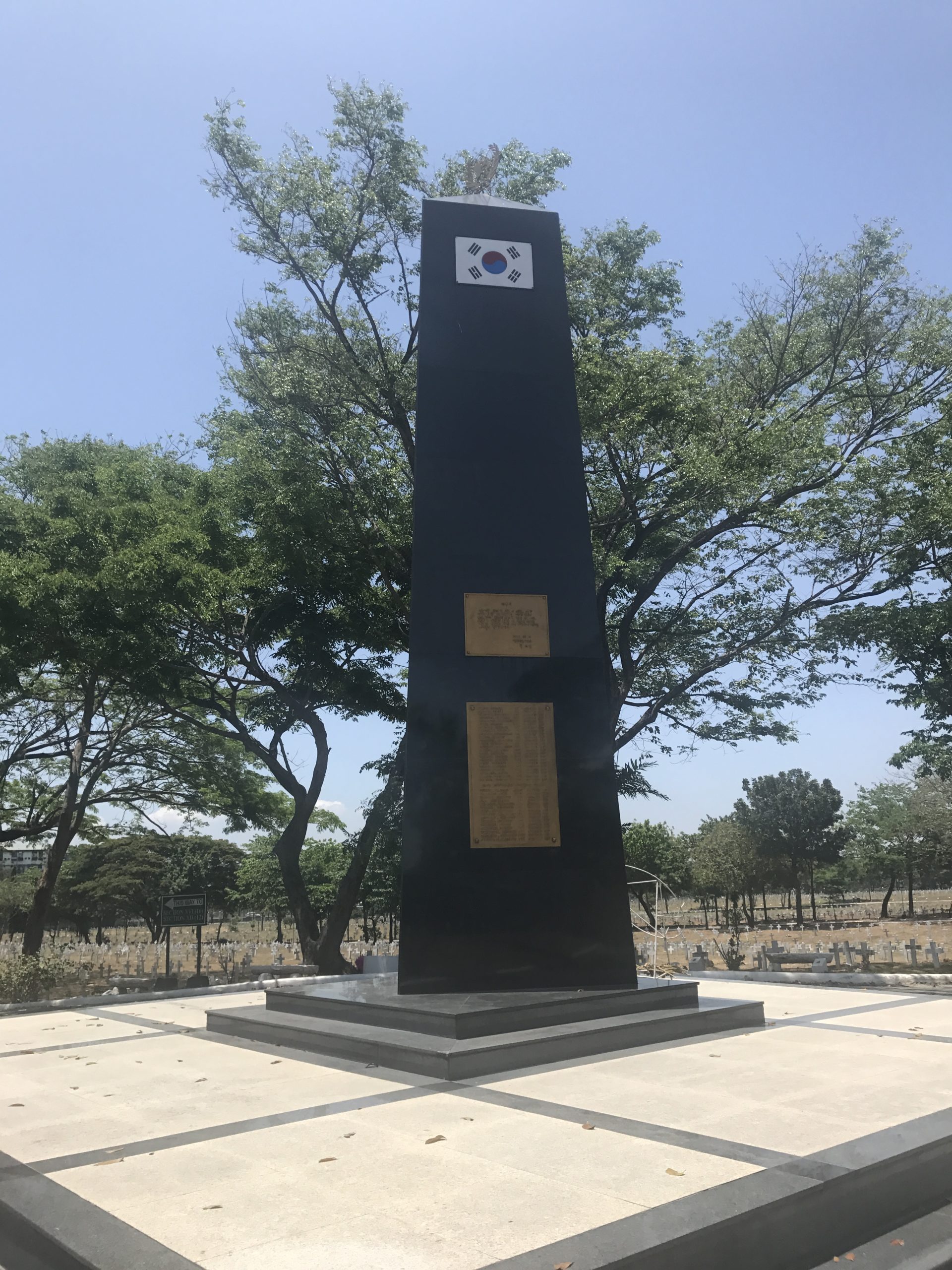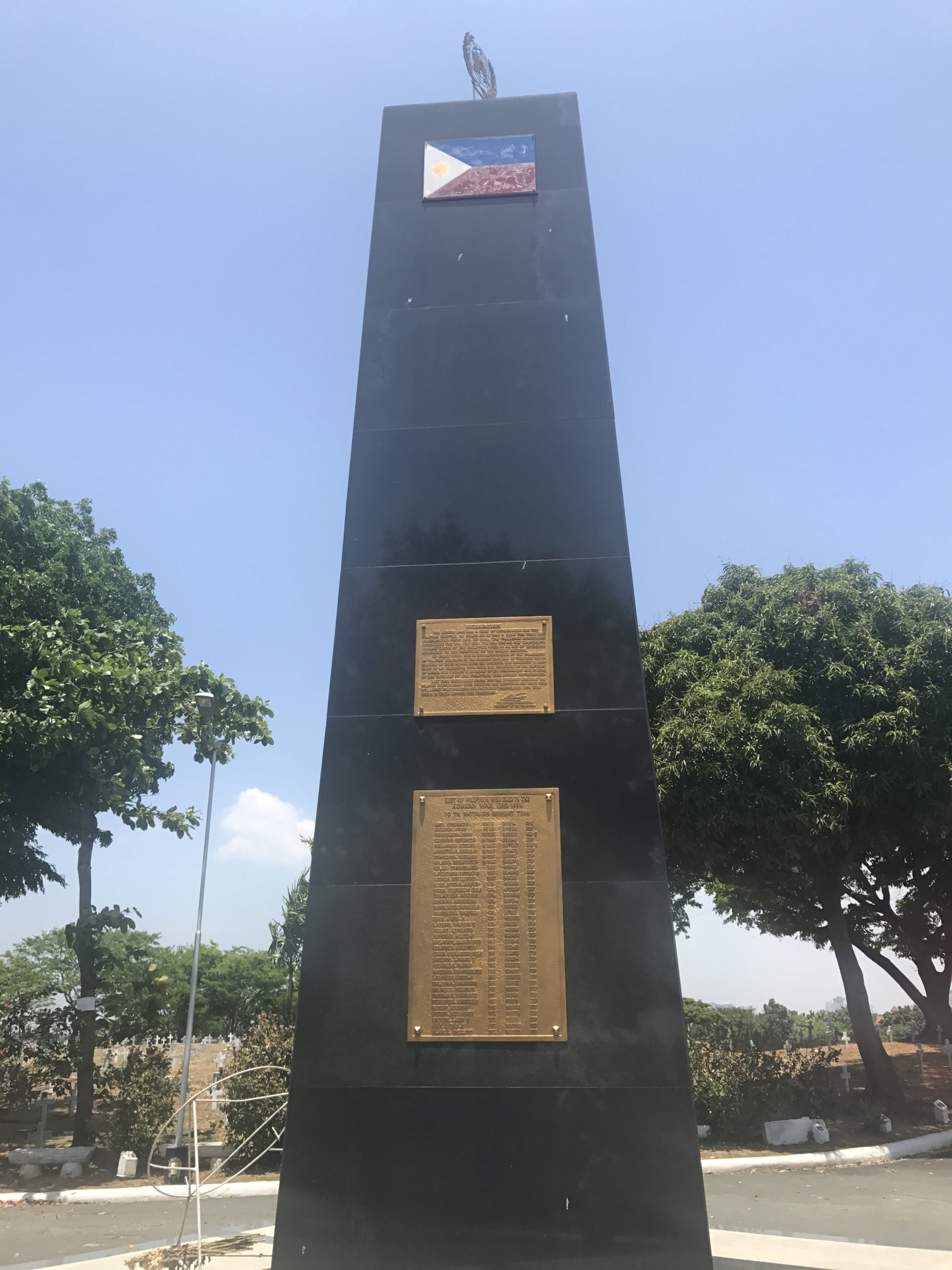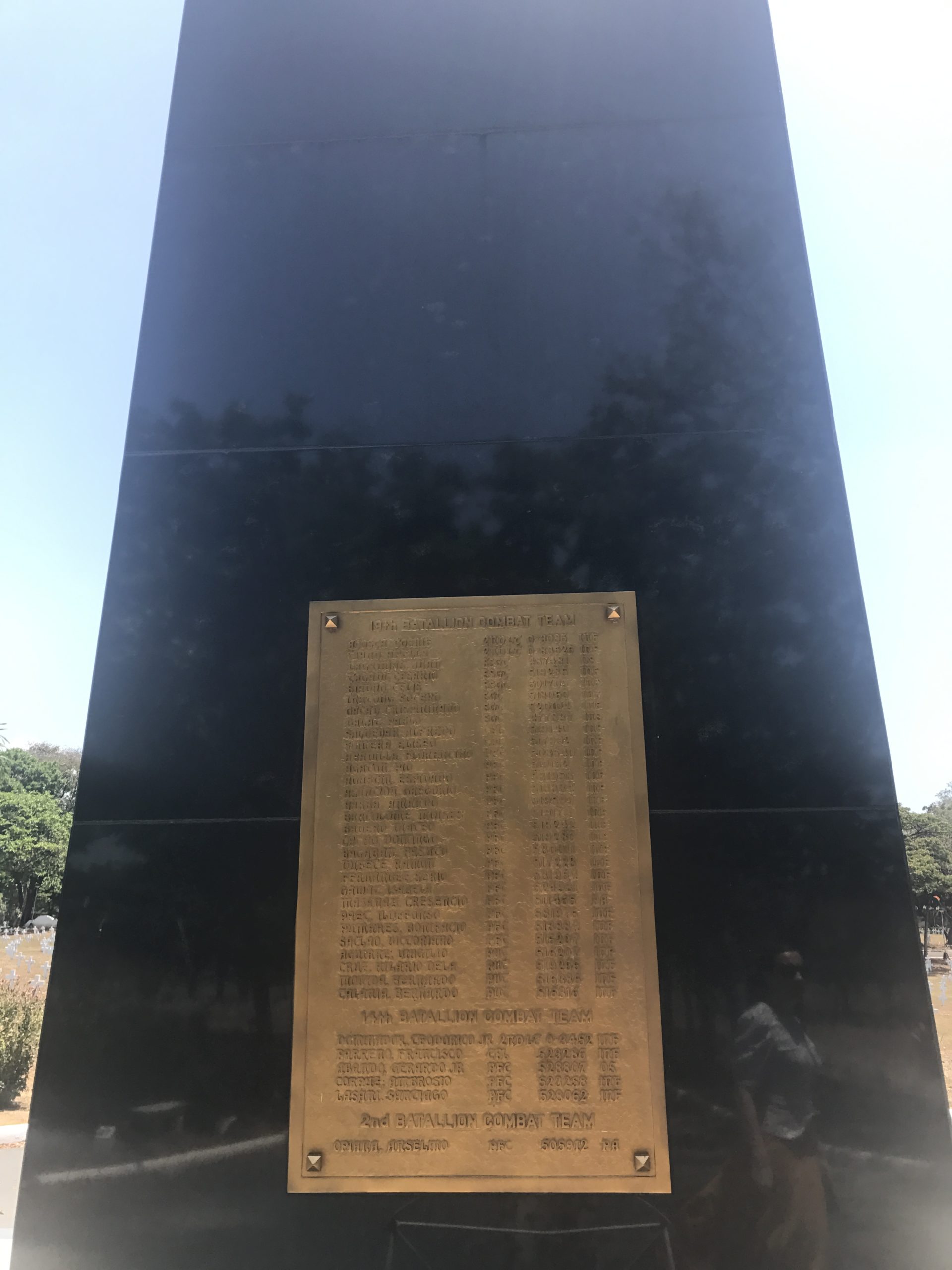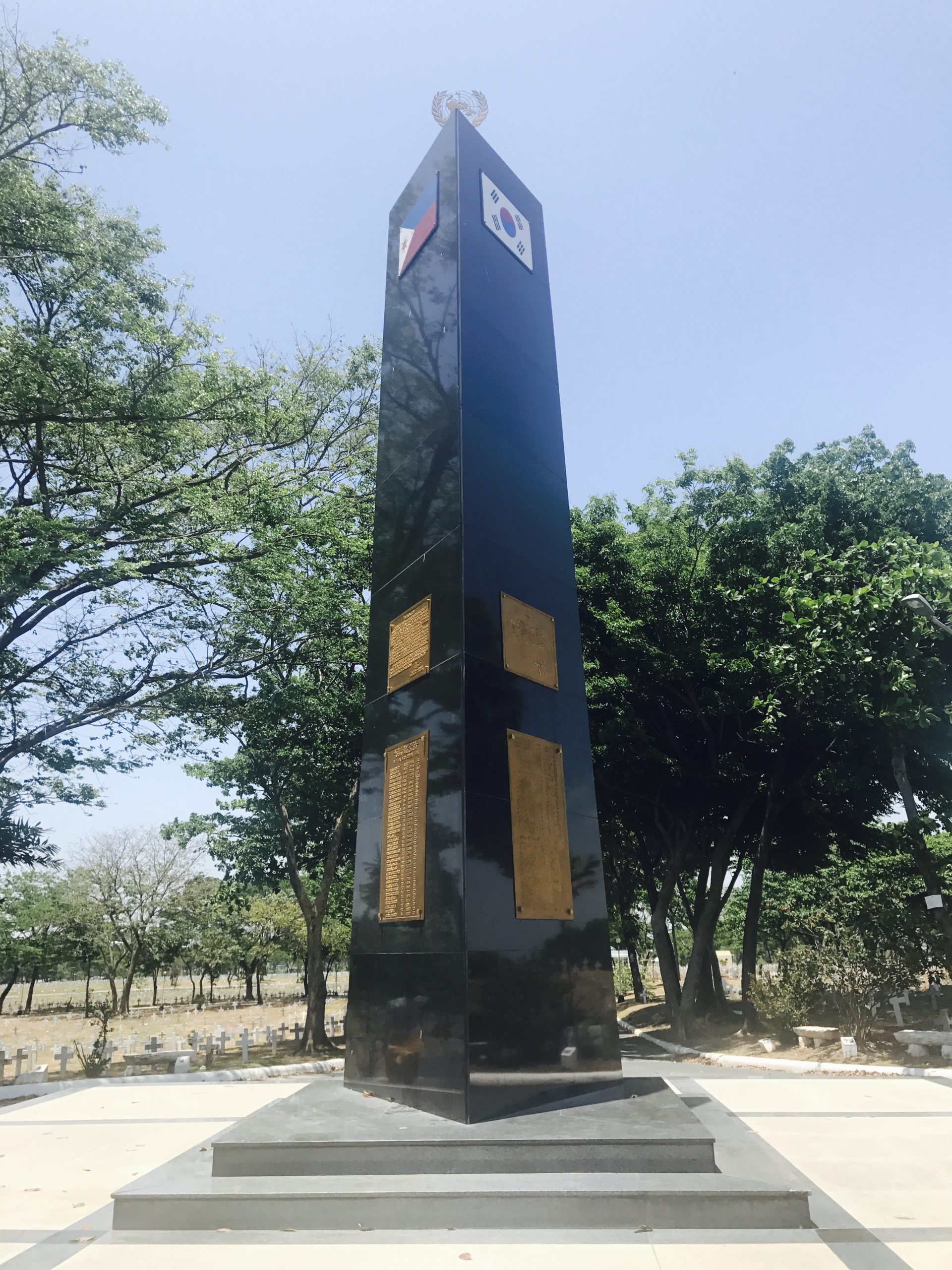Veteran Stories
>> Well, I am Mr. Maximo Young, 94 years old. Well, my war experience started with ... I was working with a company in the Philippines. That was 1941. Later on, I was sent to States to study agriculture, and then from there, I was one of those chosen to select members of the group that our government committed to be sent to Korea. That was 1950. Now initially, before we were sent to Korea, after selecting different members to compose the 10th Battalion Combat Team, we had some training. Our training ended sometime on September, so on September 15, we made our first trip to Korea aboard [FOREIGN LANGUAGE]. We left the Philippines September 15 and arrive at Korea 19 September. Upon arrival at Korea, we could see the whole area, stationed in Pusan where we landed. There were all of us armed for war. It was this time when the North Koreans invaded South Korea on 15 September the same year. So upon arrival at Pusan, our initial debarkation area, we were sent to [FOREIGN LANGUAGE] for a probation period. From there, we stayed for overnight, and then the following days, we were sent further north to acclimate ourself with the area, including the weather. The weather is very different. It started while in Korea. It was always frigid, very cold. We stayed there for almost 15 days. From there on, we were attached to a US division, the 3rd Army Division of the US. From there, we were assigned an area that is south of Seoul, extending up to about 15 kilometers north of the 38th parallel. We were assigned to patrol an area which is the main line of supply used by the United Nations coming to transport men, soldiers and supplies to the front line. Now it was an incident where our group was designated to secure a certain area not to be a North Korean area. So November 11, we were sent to patrol the area to find out whether there are some North Koreans who are disturbing our supply road. Sometimes they're ambushing friendly troops and sometimes destroying vehicles that are a part of the group that fights the North Koreans. So on November 11, I was in charge of a group to reconnect the area going north. We were the first group to more or less move to reconnect the area. With us were some segments of two companies and some medical units and some support units. Now at 7:30, we left the area from somewhere in south of Korea, going to Yujeong, but our designation was to look for the enemy somewhere at [FOREIGN LANGUAGE]. Along the way, our head group encountered a land mine. The land mine exploded, and all the Jeep which they were riding exploded and flew over, and two of our men were disabled, but we continued moving forward to [FOREIGN LANGUAGE]. Now after completing a bend, going to [FOREIGN LANGUAGE], and an area which is more or less a distance from a hill, a hilly place, we encountered simultaneous burst of enemy fire suspected to be about of 4,000 deployed along that area. We were just little found out that place where we passed after were 45 areas in preparation for any ambush for any enemy that goes north. So since it was surprise attack, all of us would lie down, and then most of our men, cadet or not, because it was a very ideal place for ambush. It was river down the road, and the enemies were all deployed up on top the area. So after several bursts of fires, my men, our men, cannot move, so I was a commander of five towns. I was the fourth town. After a lull, I patrol the periscope. Anytime you have a periscope, you can see the area around you through a telescope without being exposed. I look left and right, and I found out not a single man what belongs to my group. We were about 90 to 100. All of them were flattened to the ground in that group. So as idea forward looking at the enemy, I saw some of them already more or less conferring to each other on the left side and off on the right side. Thinking on my officer [INAUDIBLE], I know they're ready to attack because nobody could fire. So what I did: I opened my tank. A tank, it has a cover. I open the hatch and went out and manned the machine gun with this part of the armament of the tank. What I did is, I cracked the .50-caliber machine gun and started firing from the left. As I continue firing, I saw some of them tumbling down, running, some of them getting out of their trenches. I swing the machine gun from left to right, aiming at those people who already were trying to plan an attack against us. I continue firing. I split about two boxes of ammunition until later on, the support fire coming from behind from our artillery. Now when I started firing, running after this soldiers who were getting out of their trenches from left to right, and after about 15 minutes, there was a support fire from behind. So after about 15 minutes, our soldiers started advancing, returning the fire. Incidentally, after that, we were able to more or less get them to surrender. After a head count, there were about 42 dead and about 201 dead. From there, we straight to [FOREIGN LANGUAGE] to complete our mission. That is the first time that we encountered the North Koreans from the Filipino side is the first time we encountered these North Koreans. Now after the incident, I found out there are foreigners from other countries who also belong to the United Nations command, went down to congratulate me for what I have done because without the fire, I think all of us would have been as good as dead because we can not know. Just imagine an area where all of them, you have the commanding view of the area, and all of us were down there like the pigs that are being shot at. That was the first incident I have encountered. That was the first incident where the Philippine forces encountered the North Koreans, and that was the first victory of the Philippine army.
>> What year was that? What month and year was that?
>> That was 1950, 1950.
>> '50, what month?
>> '50.
>> What month, month?
>> Oh, November.
>> That was during the most difficult battles.
>> Yeah, that was the most difficult.
>> November 1950.
>> Then from there, we went north, fought there, and then from there we found out that most of those ... There were 40,000 North Koreans stationed at the area. Now when we went there, all of them dispersed because of our combined attack. Aside from us, there were support units and some planes of the Allied that supported us.
>> Well, as Vice President of the Filipinos Korean War Veterans Association, what are some of the activities that you do as an association, and what do you think is important for people to know about Filipinos who fought in the Korean War?
>> Well, you're asking me about the different activities we did?
>> What's important about Filipinos in the Korean War? What's special about Filipinos? For example, Turkish soldiers, they never left the dead. You know?
>> Yeah.
>> So every country, there's something special about that country. So what would you say that you want people to know about Filipinos who fought in the Korean War? Like Thai, they were called Little Tiger. Yes. Something about Filipinos?
>> Well, the Filipinos, when we arrived at the Korea, we found that most of the civilians that they're fleeing because most of those Koreans, they are uneducated. That's partially the reason why the Japanese, when they occupied Korea, they prohibited Koreans to study, so more or less, never educated them. So during the time, whenever attack, they can not do anything. And what were we observed in Korea were civilians, they don't know where to go. Children, plenty of children, the children were left alone. They were alone. They had nothing, nothing to eat, especially the families.
>> So what's special about the Filipinos?
>> Well, what's special about the Filipinos?
>> Mm-hmm. Yeah.
[ Chatter ]
>> [FOREIGN LANGUAGE]. What was your role? What was your role that made the presence of the Filipino contingent, critical because of the war or important to the war? [FOREIGN LANGUAGE]
[ Chatter ]
>> A significant contribution.
[ Chatter ]
>> Well, first, more or less, fighting against the Koreans and then helping the civilians who are in need of food and protection, security.
>> I know Filipinos went to Korea even after the armistice, the 5th Battalion, right, went after, and it helped rebuild Korea.
>> Yeah.
>> Maybe that's a very significant contribution in the war that ... Many other nations, they left, but Filipinos, even after, they sent another battalion to help reconstruct. I think that's very significant.
>> Well, the contribution that was assigned to the Philippines after the fight, they were there to, more or less, study the nuclear activities of ... Well, the Americans told them something nuclear, more or less expecting the world will continue, but incidentally, there was an armistice that lured about 1953 where they declared ... They stabilized rations.
>> And I know there were 41 POWs, right?
>> I have the number. Excuse me. As a result, we have 112 killed in action, 112 killed in action, and then missing in action, we have 229. And then ... wounded in action, I mean. Missing in action is 16, and we have 41 POWs, prisoners of war. Now the 41 prisoners of war, after the war, we tried to verify, follow up, their destinations. Of the 41, we were able to locate, I think, 36, 36, 36, and until now, the remaining numbers are not found.
>> Really? Five of them are not found?
>> Until now.
>> Wow.
>> We suspected that they had died, and they were never found.
>> Recovered the remains?
>> Now, for the POWs, we have 41. I think 6 of them are not also accounted for. The others have gone back to the Philippines. After 3 years there was ... After the armistice, there was an exchange of prisoners, and some of them came back.
>> But not all?
>> Yeah, yeah, yeah.
>> Oh, no. The families of the POWs that never came back, so they're just waiting?
>> For your information, the total number of Filipinos that participated in the Korean War was 4,720.
>> Four thousand seven hundred twenty?
>> Four thousand seven hundred ...
>> No, I thought it was 7,200.
[ Chatter ]
>> I thought it was 7,200.
>> Oh, no. I'm sorry. Seven thousand four hundred twenty.
>> Yes. Yeah, and now in the association there are about 3,000, right, left in the association?
>> No. As of last June, I could account for 1,700.
>> Oh, that's it, huh? One thousand seven hundred.
>> One thousand seven hundred living.
>> Living.
>> Living. And the others, out of the 7,420, the others that came back was assigned to different places, and we have no means of contacting them. Now out of that number, as of now, our living veterans, verified living, is about 34 living veterans.
>> Thirty-four?
>> Yeah, thirty-four.
>> Thirty-four?
>> Thirty-four, yeah.
>> I thought you said 1,000 ...
>> That is for the Tampa City, for the Tampa City.
[ Chatter ]
>> Because there was five visitors when the ... The 10th was about ...
>> The 1st battalion that went.
>> Yeah, that's right, battalion.
>> Yes, yes.
>> The 1st battalion ...
>> There was only 34.
>> Yeah, 34.
>> And you're part of the 1st battalion.
>> Yeah, the very 1st battalion.
>> The 1st battalion are the oldest, right. I heard there's a 101-year-old veteran. One hundred and one, is he the oldest?
>> That 100-plus ... Most of the casualties were of the [INAUDIBLE] were because of another battle that was a year long. That year-long battle started way back in April 1952. That was the time the North Koreans tried to post in order to invade the South Korean.
>> Wow. One last question, have you been back to Korea?
>> Yes, five times.
>> Wow. Five times.
>> My son, he went there last year when it was awarded the highest spirit medal in South Korea. In fact, I will give you a copy of ...
>> A citation.
>> ... a letter. I wanted to take the award, for sure.
>> What did you think about when you first went to Korea? How did you feel?
>> Well, I was single dad during the time, and I was one of the selected because I came from Fort Knox to study the armored veteran. When I went to Korea, I never thought I would be coming back because it was the time when the North Koreans were very forceful in trying to invade South Korea. Now my impression about South Korea when I was there, it was a place where people are very poor. They were very, very poor. You could see them trying to get food from us, and mostly is what I said, most of the people there are uneducated, very poor, and they have no means of life except farming.
>> But now ...
>> Wow, terrible. The are the best shipbuilders.
>> Mm-hmm.
>> In fact, they intended to open up four shipyards in the Philippines so that they will continue to build ships because shipments is a problem. You can transport anything. Back then, it was very costly. Unlimited, but shipbuilding, I think that is what the ambassador told us one time when he said, it was 3 years ago, the ambassador of South Korea, we were having a meeting. The intention of South Korea is situate that the Philippines, which is very, very poor now compared to 1950. We were the second best country, but after the World War II, everything was destroyed including our factories, our everything. Now what the ambassador told me before was that the intention of the moment of South Korea was that within 30 years they want the economy of the Philippines to be in power with Korea. In other words, they will support the Philippines' infrastructure, agriculture, everything, so that way, 30 years, that was 2013. He said 30 years, that was the intention of South Korea. Thirty years from that time, they want the economy of the Philippines to be in power with South Korea.
>> I know. I visited too many countries, and when I went to the memorial today, I was amazed, and I said it's the best memorial and museum that I've ever seen in any other country. You know?
>> Yeah.
>> The facility, the Pepco facility?
>> Yeah, yeah, yeah.
>> It is amazing.
>> Very amazing.
[ Chatter ]
>> I was so impressed. It's maintained beautifully. The museum is very nicely presented and display. The auditorium, the memorial ...
>> Yes, yes. Way back 800, I think.
>> Just so wonderful, and I'm very proud to know that the Korean government has been able to build that to honor and thank the veterans. So I was very proud to hear that. I hope that you are very proud when you went to Korea recently to see skyscrapers, Hyundai, Samsung, LG. Korea is very prosperous, and Koreans are successful because of your sacrifice. Yeah.
>> Well, there is a way they have best fusion because the North Koreans has not gone down to South to destroy. They have a very big space.
>> I am Robert Jupar Domingez. [INAUDIBLE]. I served in military service in 1950 after graduating from the high school. I missed a [INAUDIBLE] in the military service. Then when the war broke out in Korea, it was 1950. I volunteered. [FOREIGN LANGUAGE]. I was not lacking the joy and the intent of a newcomer. And then the next battalion, [INAUDIBLE]. I was not lacking. On the third time when I visited, I was selected, so from there, we were regrouped [INAUDIBLE] volunteer to replace the 20th division. We were regrouped there from all volunteers from the Armed Forces of the people. My rank then was a private first class. I belonged to the artillery, so all volunteers were regrouped at camp all the time. Then when all the volunteers were there in Camp Aldinado, we created us from the branches of service where we belonged. Of course, I belonged to the artillery, so I was with the artillery group. And then parting group, medical group, every group. So we all just were already grouped, and the size of those volunteers, the number of people that we completed, we moved the [INAUDIBLE] at the time, the Port [FOREIGN LANGUAGE]. Then we were regrouped again by branches of service. Of course, I was trained in separate from the field artillery, so I was with the artillery. So when everything was grouped already, artillery, infantry, medical, logistics, and others, then we moved again to Port [FOREIGN LANGUAGE] at the time. So then we started our training. I can't remember the number of months we were trained. So after the training, there was another group. We would group again to North of Korea. I cannot exactly remember the group where I belonged. So then we went to Korea. We take the LST at the time. You know about this LST? Landing ship, tank. The ship of the Korean Army of the Armed Forces [INAUDIBLE]. Landing ship, tank. They called that LST, landing ship, tank. But we were training for Korea. We retrained again. Retrained at that [FOREIGN LANGUAGE] was a mountainous area. That's where we trained. After our training, then we were shipped to Korea. That was ... I cannot remember the date, but the month was July 1950.
>> '53.
>> Yeah, '53, 1953. So that is it. We sailed to Korea. We rode the Philippine Navy ship, we called that LST. We called that LST. We arrived in Korea July 1950, yeah? 1953. Yeah. [INAUDIBLE]. So that is it. We really [INAUDIBLE]. That was July 1953. Excuse me.
>> That was the Armistice. July 7th, 1953 was the Armistice. Do you remember when the war ... They signed the cease-fire.
>> Three fire?
>> Cease-fire, Armistice.
>> Armistice, yeah. That was already ongoing, the Armistice was.
>> Do you remember a little bit about why it took a long time for them to do the cease-fire agreement? No?
>> I have no idea about that.
>> So what did some ... What did you do during when you weren't fighting?
>> What did you do?
>> When you weren't fighting?
>> Fighting?
>> Uh-huh.
>> Because I belonged to the artillery ... This is the battle pit. This area, we are about 7 to 10 kilometers at the battle pit. It belonged to the artillery canyon. [INAUDIBLE]. So before the infantry people could enter, advance, you had to [INAUDIBLE] with one of our ammunition. So it depends on the front line how the people just kept themselves, the enemy, because there is a radio telecommunication device overhead, and [INAUDIBLE]. So if the enemies have already moved backward, then cease-fire. The firing of the infantry people that ceased already except over here coming from land, but the Chinese communists [INAUDIBLE] come in from the [INAUDIBLE] give you password coming from Manila, [INAUDIBLE] front line somewhere along, well, shall I say ...
>> [FOREIGN LANGUAGE]
>> No, no, no. Somewhere around Yuki. That is the approximate distance from the front line where the enemies and the Chinese are in training [INAUDIBLE] from our troops, the union troops. Yeah. So that is it. That is the system of the fight. Normally, we fight in Korea at the time during the night [INAUDIBLE] during the day.
>> Can you look here? Don't look there. Look here and speak a little bit louder.
>> All right.
>> This the camera. Don't look there.
>> The fighting in Korea at the time was mostly during the night. Excuse me. During the day, everything was done with fighting, but we from the rail [INAUDIBLE] canyon, we have to pile in. [INAUDIBLE] with our service. Have seen some movements there, the enemy, and they request from us a pilot and a server from the artillery. [INAUDIBLE].
>> So you fought during the 3rd Battalion that saw a lot of battles, right? Many battles, many combats, fights, yes.
>> Engagements?
>> Yes, many engagements, right?
>> Yes. That's why I said the fighting during that time was mostly during the night because they know [INAUDIBLE]. Many people were from that place, so all them prepared to go fight during the night, while during the day we kept defending also our positions. They were also defending their positions. But when that mess started, it's like fiesta.
>> So when do you sleep?
>> In our system in the artillery because we have the [INAUDIBLE], we have 10 in a team, we divided that by the infantry. So the first group starts at 6 o'clock, then after 10 o'clock, then after 3 o'clock, then after 5 o'clock. That is the system.
>> And you rotate?
>> We rotate, yeah. Yeah. We rotated.
>> Did any of the ...
>> I am referring only to the artillery. I don't know what the infantry ... The infantry people were just walking on the front line. The artillery group, we have big guns, so we have ...
>> Super bazooka. Super bazooka. I saw super bazooka.
>> Bazooka, for those people in the front line, bazooka. We have that. They have that. But we [INAUDIBLE].
>> What?
>> [INAUDIBLE].
>> What is that?
>> In our place.
>> What is that?
>> Cannon.
>> Cannon! Cannon, oh.
>> Cannon. Cannon, yeah. We had the cannon and myself. That's why sometimes, I can't understand you because during the night, our ears are popped.
>> Oh!
>> Up to now I can't ... Specifically the right one because I used to fire the cannon, so the blast of the cannon will affect your ears.
>> Oh! No earplugs?
>> No earplugs. They do not encourage us. The officers at the time were not ... Excuse me. We were not told we need that. So when you hear ... Specifically myself was the one who was pulling the lanyard of the [INAUDIBLE]. No. You cannot hear that good now. You cannot ... Let's say I'm the one firing the hose. If you do not pull that ... I'm the only one pulling it, but there is a command. There is a command on the [INAUDIBLE]. We have the command in the rear, which is [INAUDIBLE] around 50 meters back. That is the one giving the command. When they give the command ... There are six cannons, but they are just for [INAUDIBLE]. So when the six cannons are ready, you report to the one giving the command. Number one, ready to release, not in the line of [INAUDIBLE] but number one is posted as number one. Number six, again, is [INAUDIBLE] because there are six cannons [INAUDIBLE]. When the six cannons are ready, the command post, the personal at command post, "Ready?" because there is the one pulling the line. Bam! And the cannon fires. The system we used.
>> What do you think about Filipinos' contributions in the Korean War?
>> Filipinos?
>> Yes because, if you know, there's 21 nations that fought in the Korean War all over the world, but what's so special about Filipinos?
>> I cannot exactly describe it, but I belong to the [INAUDIBLE], as I said, It's about 7 or 8 kilometers away from the front line, from the infantry people, before the infantry people who are engaged in fighting, so I could not pass this. But what we hear from them is the fighting starts because the fighting starts the moment it gets dark. It starts already after the morning when it's already daylight again. That's just how we fight people.
>> You're a part of the association, right? You're a member of the association?
>> Oh, yeah. I'm a member of the Veteran's Association.
>> Yes. Aren't you a proud of the association you're part of, a member?
>> Yes.
>> Right? So for, let's say, an American or some Koreans, they want to know about Filipinos in the Korean War. What would you say? "Okay, we did this. We were" ... something special about Filipinos.
>> No, there's no such thing. We are equal there. Like other ... and like other UN troops of the time, especially the Thailanders, they can't understand English, and some others can't understand English. For the Filipinos, we talk English with the Americans and other UN troops.
>> Oh, so it was easy to communicate?
>> Right.
>> Yes, easy to communicate, which is very important. Communication is very important.
>> Yes. Yes. Yes, important.
>> So they relied on you for other ... Right, they relied on you? Ethiopians, they couldn't speak English well, right?
>> Right.
>> Turkish, they couldn't speak English well.
>> No.
>> Yeah.
>> No. No. No. They're like [INAUDIBLE]. The Turkish are there. We can't understand. We can't [INAUDIBLE], not like that. They were ready.
>> Do you remember seeing Greeks, other people? Do you remember?
>> Other nations, you mean?
>> Yes. Yeah.
>> Yes. Thailanders. What other nations?
>> Greece.
>> Plenty of the United Nations. I can't exactly remember. I can only remember the Thailanders, Filipinos ... No, I can't remember.
>> Greece!
>> And do you remember seeing Koreans? Do you remember seeing Koreans?
>> The Koreans, yes.
>> Civilians?
>> There were troops from Koreans there already, but it's really hard to say something about the Koreans.
>> Children? Orphans?
>> Yeah, children, orphans, plenty. Tough job when you move them. You go to Seoul. Tough job visually to see the people [INAUDIBLE], and we have [INAUDIBLE]. We are going to come [INAUDIBLE].
>> They were so poor.
>> Yes. Yes, so poor. [INAUDIBLE] poor.
>> But now ...
>> Yeah.
>> Right? You've visited Korea. They're big now, right? Big, tall, and ...
>> In Manila. In [INAUDIBLE] they can't talk English.
>> Yes.
>> There were many times when we go to Korea for the revisit program, and [INAUDIBLE].
>> [FOREIGN LANGUAGE]
>> Yeah, I've been there in Korea.
>> It's amazing, right? Yes. Yes. Yes.
>> You can see the progress in the restored areas. You can't remember where was the fight, can you?
>> I hope you know that ... I hope you're very proud.
>> Yes. Of course I am.
>> We're very thankful. We're very grateful. We're very grateful.
>> Other nations, believe in us, the Filipinos, number one. We can speak English.
>> Yes. And you were experienced from World War II?
>> No, I did not ...
>> No, I know. Not you, but Philippines. Philippines ...
>> Yeah, Philippines.
>> Philippines fought in World War II, so you had a trained Army. Yes. Yes. Thank you so much for your time and your service very much.
>> Hey, everybody. I am now inside the museum hall of Veterans' Association, and I wanted to share some stories of the veterans in their own words. So with me here today, I have four Korean War veterans. There are only 500 remaining in the entire country. Seventy-five hundred went, but here they are. Now first time before I start. How old do you think my grandpa here, Max, how old do you think he is? Okay? If you guessed 86, not even close. Grandpa, how old are you? How young are you?
>> Ninety-six years young.
>> Ninety-six years young. I think he's living up to his name because his name is Maximus Young, so we will start with him because he is the youngest. Okay. So I'm going to start here, Grandpa. Do you want to face this way?
>> No, it's okay.
>> Okay. So please tell us your name, your ... Oh, he also served in World War II, Korea and Vietnam. Yes, but right now, could you show us ... tell some of your experiences in the Korean War?
>> The Korean War?
>> Yes.
>> Well, I'll first explain that we had ... We arrived there, and the first night, we were in a boat of [INAUDIBLE]. Now we were issued sleeping bags. The following morning, it was a surprise. Instead of my soldiers waking up at 5 or 6, at the earliest crack, we were screaming. It was, some of their bunkers ... some of their sleeping bags were with snakes, so we were sleeping in a rice field with a ring of snakes. [INAUDIBLE] and from there on, we walked and started on, and from there, we would stand up [INAUDIBLE] and our supply line, we went by the third army among them. [INAUDIBLE]. My son, Julian Sanchez, not in that unit, and they were disturbing our supply line. Some of our crops were destroyed. Some of our crops were broken outside, so what the country did was for us to [INAUDIBLE], was changing because the place where most of the North Koreans were. It was in November, in mid-November of 1951 in November, [INAUDIBLE]. Now as we were going north, [INAUDIBLE] our craft hit land mine. Land mine more less throw our craft about 5 to 10 meters high and hit some people that were in a car, but they were thrown up. Now that was a signal then that we were [INAUDIBLE] because in military operations, usually [INAUDIBLE] before there is a [INAUDIBLE]. So [INAUDIBLE] that the land mine was an initial warning to the troops that an enemy is coming. As we passed [FOREIGN LANGUAGE], many people went straight, and then in a certain area, it was about 800 yards. We saw later on, [INAUDIBLE] pass the bank, that's where we start finding the guys. It was 10 o'clock in the morning.
>> I just want to stop here because isn't his memory impeccable? How do you remember all the details, what time it was? Oh, my goodness. Wow! I barely remember what time it is right now.
>> Literally, when you visited me, you were ...
>> Aw.
>> Aw.
[ Chatter ]
>> Aw.
>> Seeing you bring this feeling back.
>> Aw.
[ Chatter ]
>> And when he was farming last year, I visited him in Manila. He was at the hospital, so I visited him in the hospital wearing a mask.
>> Oh, yeah, wearing a mask. [INAUDIBLE] if this is the end, there were about 10 bunks. All of those bunks was [INAUDIBLE] in the area. So [INAUDIBLE]. All of the [INAUDIBLE]. Now our plan [INAUDIBLE] the first job is follow by the soldiers, so on and so forth. [INAUDIBLE]. Now when they find us suddenly, we were all paralyzed. Even the soldiers had to float [INAUDIBLE]. So what I did, what we did was [INAUDIBLE] and found out that the soldiers there were dropping, literally dropping, and certain [INAUDIBLE] certain area. [INAUDIBLE] ready for an attack. So it was terrible. [INAUDIBLE] what I did, I picked it back up and then turn right to the hills, but it so happened that [INAUDIBLE] the right side wasn't prepared, so we wake up with [INAUDIBLE]. So what I did is, I told my brother to lift up, but [INAUDIBLE] and this was hit. So what I did, I opened the compartment [INAUDIBLE]. You can see the whole area [INAUDIBLE], and so the soldiers [INAUDIBLE] in different sections. So I opened my [INAUDIBLE]. There was no protection. I suddenly walked and more or less ducked and found five boxes of [INAUDIBLE] and started firing at the roof where they were assembled. As I started fighting, [INAUDIBLE] all of them jumping. No, no, [INAUDIBLE], for every five bullets, there's one tracer to find out where the direction of your firing.
[ Chatter ]
>> I could take the firing ... tracer bullets. [INAUDIBLE] a tracer, which will find out where you bullets went through. So I started fighting out on the trenches. I also fought. There were soldiers. There were soldiers. I continued fighting for almost 10 minutes, so when I started fighting, the soldiers sat up and started fighting, and all of a sudden [INAUDIBLE] supported ...
>> Yeah.
>> ... supported the fighters.
>> So we just finished watching this ...
>> After 45 minutes ...
>> Yes, and he was a hero.
>> Wow.
>> Well ...
>> And he's not saying it.
>> That's just ...
>> And he's not saying it, but he's a hero. You know what I'm going to do? I'm going to show ...
>> Okay.
>> Look at him, his medals. Right? And he received recently last, 2 years ago, the Order of Military Merit which is, I think, the highest honor from Korea from the president, so look at the medals. So this was donated to the museum, and now it's displayed here. That is Grandpa Maximus Young, and I know, since I remember from last year, his secret to staying young is, he's active. He plays a lot of badminton, and he's very, very optimistic, and he has a beautiful wife, so that's the secret. Okay?
>> And in for mean time, stop calling me Grandpa. I'm just as spirited and handsome as you are.
>> Yes. Well, I am also going to ask ...
[ Chatter ]
>> General. So he retired as a brigadier general, right?
>> Yes. I am a retired general.
>> Yes.
>> And [INAUDIBLE].
>> Yes.
>> But I was only second lieutenant at the time I went to Korea in the 2nd Battalion, Number Two, and [INAUDIBLE]. After they said, "Hey, you, check on the city," [INAUDIBLE] there was already a cease-fire, and the United Nations officers were already at the demilitarized zone, but then upon arrival in [FOREIGN LANGUAGE] or that portion of the demilitarized zone where in the United Nations forces were laid out, we were assigned a division reserve of 24th US Division, the 2nd Battalion Combat Team. So actually by the time we got there to Korea, [INAUDIBLE] there was no more fighting, but then there was a cease-fire but no peace, and I [INAUDIBLE] that there were possibility that the Communist Chinese would resume their infiltration through the demilitarized zone.
>> You're absolutely right. So even after the cease-fire was signed, there were many skirmishes.
>> That's true.
>> They were still fighting, and people even died ...
>> Yeah.
>> ... on both sides.
>> In fact, several of my men, about eight men, when we were at patrol, the area in [INAUDIBLE], from the other side blew up the last night, and it holds, what, of eight men, of my men, in 2nd Battalion [INAUDIBLE].
>> And he retired as a brigadier general for how many years?
>> I've been a brigadier general since 1970.
>> And he's only 86 years old.
>> Ninety-two.
>> Ooh, just kidding. Ninety-two. Oh, man. I think I need to move to the Philippines because something you're drinking there, you seem very young. Okay. This is now the president of pep talk. Now he's 90, 91 years old.
>> Yes, 91 years old.
>> Young, yes, what was ...
>> I went to Korea. I was 25 years old.
>> Yes.
>> Second lieutenant, [INAUDIBLE]. Our location deployment was [FOREIGN LANGUAGE], Bali, [INAUDIBLE], so [FOREIGN LANGUAGE], Bali, [INAUDIBLE], a few weeks there, but up there about, I think, 14 months. There was [INAUDIBLE] brigade, [INAUDIBLE].
>> Yeah.
>> [INAUDIBLE] more than one company. So we were made to ...
>> Replace them.
>> ... to replace them and climb up the hill.
>> Yes. I saw the movie, in the film.
>> Yeah. And as we go up passing by the tree where [INAUDIBLE] this pile-up, [INAUDIBLE] such and such there, dead people, so sometimes, you have to think about it.
[ Chatter ]
>> The smell of the dead and the injured. I know. You still remember that, huh?
>> Oh, yeah.
>> Yeah. We get to remember.
>> Well, I hope that now you reflected, and it's not traumatic for you anymore. I hope that, okay, that you don't get nightmares.
>> Very good.
[ Chatter ]
>> [INAUDIBLE]. We trained.
[ Chatter ]
>> Yeah.
We trained.
[ Chatter ]
>> So it [INAUDIBLE], we will never die.
>> Well, I hope you will live forever. Okay. Last but not least, the youngest of the bunch. You're the youngest, right?
>> Yep.
>> Yes? Okay. Now tell us your story.
>> Oh, very simple one. You might be interested to know why I went to Korea.
>> Okay. I am interested.
>> I was 18 years old, newly graduated from high school when someone [INAUDIBLE] ...
>> Uh-oh.
>> ... and me, and because of my desperation, I thought, I'll voluntary [INAUDIBLE].
>> Oh!
>> So what I did was got myself listed as a private in April of 1952, and on March of the following year, I was already going.
>> Mm-hmm.
>> I was barely 21 when I was in Korea, and how the Koreans do it, [INAUDIBLE] pretty girls, very amusing.
>> Amusing? Oh, amusing.
>> And actually 3 months after we were to Korean front lines, I enjoyed my first taste of R & R, meaning rest and recuperation where I met beautiful women. I tell you, they were very accommodating. In fact, The second time I met her, after 1 month, she was already my girlfriend.
>> Oh!
>> So fancy that.
>> Yeah, so ...
>> No. I feel very lucky in Korea, but I arrived in Korea in March of 1953. I was promoted to [FOREIGN LANGUAGE], one stripe, one round, I get.. After 2 months, corporate. After 5 months, sergeant.
>> Wow.
>> In a period of 5 months, I got three stripes.
>> Wow!
>> The third was the target. In September of the same year, in September of 1953, I was sent to Tokyo, Japan, to be the rising sergeant of [INAUDIBLE] to the United Nations Command in [INAUDIBLE].
>> Wow.
>> Yeah.
That was a bold moment.
>> Yeah.
>> ... for my country and heroism in action, not in the front lines but in the country because I belonged to the girl concerned with [INAUDIBLE]. I never should have brought that. I was [INAUDIBLE], and so after that, I was still in Japan in the union, the Wartime Division. By the way, I am very proud of the Wartime Division. There is something which holds the Wartime Division distinct from the other divisions.
>> Yes.
>> We stopped the shooting right in Korea! Did you know that?
>> Yes.
>> [INAUDIBLE] July 27th, 1953, and the pep-talk union that was in Korea at that time [INAUDIBLE] the importance of [INAUDIBLE] battalion [INAUDIBLE].
>> Wow.
>> So that is [INAUDIBLE].
>> Thank you. You know, actually, it's very nice to see that your memory of war is not so dark, but it's actually ... You know, you're ... He's a great storyteller.
>> Yeah.
>> And he has a very good sense of humor. I love the fact that your recollection is very pleasant.
>> Yeah.
>> I love that, that you're not holding pain and bitterness. So thank you so much, and you're absolutely correct. I also love the fact that you take so much pride in what you and the 14th Battalion contributed. I think every soldier who went to Korea should be very proud. It doesn't matter, like you said, whether you were in the front lines or the back line or in the office. It takes an entire military ...
>> Yeah.
>> ... not only one military but of many different United Nations, and then that's how we were able to stop fighting.
>> Yeah.
>> And, well, technically, the war hasn't ended, but look at me. I was able to, you know, gain freedom thanks to you and to all of you, and so all of them, I gave this heart.
>> Yeah.
>> Yay. Yay. Do you remember my heart with the flag, the American flag? Well, since they're Filipinos and not American, but I gave them this piece of ...
>> Thank you very much.
>> ... this piece of my heart.
>> Much love, much love.
>> Yeah, much love ...
>> Much love.
>> ... much love that all of you can remember my heart, my love, my gratitude.
>> Thank you.
Thank you.
>> Thank you. Thank you.
>> [FOREIGN LANGUAGE]
>> Oh, yes. [FOREIGN LANGUAGE], and so again, everybody, these are my grandpas, my colloquial grandpas. Yay.
[ Chatter ]
>> So I'm so grateful that we came to meet you on such short notice, so, everybody, let's say ... What's a good Filipino word to say?
>> [FOREIGN LANGUAGE]
>> [FOREIGN LANGUAGE]
>> [FOREIGN LANGUAGE]
>> Thank you. Bye.
>> Okay. Bye.
>> [INAUDIBLE]
>> Hi, everybody. This is the last stop, last video in the Philippines, but I want to tell the story of the president during the Korean War. The president sent his only son and ...
>> Son-in-law.
>> ... his son-in-law to also fight alongside the 7,500 who volunteered to go to Korea.
>> Yes.
>> Talk about really believing in something. He really believed that it was more the defense, the democracy and freedom that it was worth sending his own son, so I am here at PEFTOK, the Korean War Memorial Hall with the director here, Mark, who is a good friend now. [INAUDIBLE] in touch, but he's going to give us more explanation of this center, so let's go in.
>> So before, I explained what is the reason for this wall. So the center was inaugurated, or the museum was inaugurated in March 29, 2012, so it's about 7 years old.
>> Wow.
>> PEFTOK was established under the administration under secretary Ernesto Pernia, so up to [INAUDIBLE] office.
>> Wow.
>> Yeah. This was inaugurated by no other than the president then, President Benigno Aquino III and along with the Minister of Patriots and Veterans of Korea, Minister Park Sung-Choon.
>> Yeah. You know, again, the Philippines has the best center of Korean War veterans I have seen anywhere in the world.
>> Thank you for that.
>> Yes, so thank you, and again, of course, this is a most renowned, most well-known saying, that freedom is not free. It is paid for with the blood of fighting men and stained with the tears of loved ones left behind, and ...
>> That's also Philippines Expeditionary Force to Korea, 1950 to '55, so for 3 years, we fought the North Koreans. We fought the Chinese. We fought the Russians. For the last 3 years, from '53 to '55, we help rebuild South Korea.
>> I know. So we're going to go on the tour through this way. So this is very well-done with a lot of detail, a lot of detail, so ...
>> This is the general side tour stating the Korean War history, and this will give you dates, of course.
>> Yes.
>> A general information about the PEFTOK, so about the fight battalions that we sent during the war, beginning in September 1950.
>> So September 15 is when the war started getting very ... I'm seeing a lot of action.
>> Yes.
>> Remember Inch'on Landing ...
>> Inch'on.
>> ... took place September 15th, so here, the five battalions are ...
>> The tenth, so the tenth battalion combat team, the first Filipino battalion to be sent during the war.
>> And they, in the Battle of Yultong, I visited the memorial in Korea honoring Filipinos.
>> In Yeoncheon.
>> Yup, in Yeoncheon, and there, the Battle of Yultong, the Filipinos were outnumbered, like, 900 to, like, 40,000.
>> Forty-thousand.
>> Yes. I wasn't making it up, and they stood ground, and that one was a good one for them, right?
>> So we lost just 26 soldiers.
>> So the second ...
>> Battalion, it's the 20th battalion combat team, so ...
>> Mm, and [INAUDIBLE]. Okay. I want to point out something here that I have never seen anywhere, okay? I've never seen the entire roster of troops in any country.
>> So only us.
>> Yes. I've never seen it. We have the names of those who died.
>> Okay.
>> But we don't have names of those who served.
>> Served.
>> So all 7,500 are here.
>> Are here.
>> Oh, my gosh. Yeah, and their number.
>> Yes, their serial numbers, their military special here are all included.
>> That is so wonderful. I just love that, and so here again ... Oh, I just wanted to show this one because it gives you an idea of the total number of troops. America, 1.8M. Philippines sent almost 7,500, so that was actually ... You're the, maybe, one ... like, the fifth largest?
>> Yeah.
>> Yeah, right?
>> Fifth.
>> Yeah, the fifth largest, and 112 did not come back, so ...
>> Some of the prisoners of war.
>> Oh, okay. How many were there?
>> Forty-one were prisoners of war, and we were able to get back in 1953.
>> Wow. Okay. So here is, again, the 19 battalion.
>> Nineteen.
>> They fought in 1952 to '53.
>> So this is where president's giving of son belongs. He's with the 19, and his son-in-law as well.
>> Yes. The son-in-law, right, or son, they were not in combat, but they were doing signal, and he requested that he see action, right?
>> Yes.
>> Because he wanted to prove to the president that he would not be spared, but he was also brave enough, but luckily, he made it home alive.
>> Yes.
>> Oh, another thing, and I immediately sobbed. It made me cry when I [INAUDIBLE]. It was the most poignant movie, but was it the son or the son-in-law where he was diagnosed with cancer?
>> The son-in-law.
>> Yeah, the son-in-law, and he wanted to go visit the [INAUDIBLE]
>> The [INAUDIBLE]
>> Yeah.
>> That's his last request.
>> That was his last request. That really broke my heart. Oh, my god. Oh.
>> And his name is First Lieutenant Gonzalez, the air force pilot.
>> Oh, wow. And this is president Quirino ...
>> Son, son-in-law.
>> Son-in-law, yes, and so this was the last remaining battalion, right?
>> Yeah, the fourth battalion.
>> Oh, fourth battalion, and they stayed until '54. Oh, yeah. And here's the last.
>> Yes, so this organized to reveal Korea.
>> Yes.
>> These are the engineers, the teachers, the nurses, the doctors.
>> Yes. Another thing I was touched with in the video was that when everybody left, there was one officer and 14 men that stayed for 3 more months ...
>> Yes.
>> ... to just help kind of pack things, right?
>> Yes, logistics.
>> Yes, but when the 15 of them were departing home to come back home to the Philippines, they were given full military honor and send-off, and I remember in the video him saying that was the spirit of the United Nations and democracy.
>> Yes.
>> Yeah. That was another heartfelt moment for me, so again, major Filipino [INAUDIBLE] victories are. There are five [INAUDIBLE]
>> So that's [INAUDIBLE], so that's November 11, 1950. This is where the battle [INAUDIBLE] Young got his gold cross.
>> Yes, yes, and then ...
>> And then Yultong, of course, which is very proud moment for Philippine military history, and then we have Battles of Hill Eerie so where president Ramos became known.
>> Okay.
>> Then the next one is ...
>> Oh, yeah. What that means is that he was a second lieutenant at the time, but later, becomes the president of the Philippines. Yes. And then ...
>> Yeah, Battle for Combat, August number 8. That's a 5-day battle between the Chinese and the Filipino soldiers.
>> Okay. And the last one ...
>> And the last one is the Christmas Hill Battle, June 15, 1953.
>> So these are not the only battles they won. These are the major battles that they won.
>> Yes.
>> Yes, so the Philippine Air Force and Navy as well as the battalions were also in the Korean War.
>> Yes.
>> Right.
>> The Korean War was the first armed forces of the Philippines joint operation, so each battalion [INAUDIBLE] air force officer [INAUDIBLE].
>> Wow, so that is awesome, everybody! And last but not least, here is their uniform. That does not look warm enough for the cold, okay, because that looks like a raincoat almost, because as you know, the Philippines are islands, and it's hot here, so imagine going to Korea where they've never seen snow probably.
>> Yes. Actually, that's the one thing that they encountered that [INAUDIBLE] the snow.
>> Yes. Yes.
>> They could fought anything, but not against the snow.
>> Yes. They said they were also fighting against the cold. Here are their weapons. Again, warm clothes that don't look warm.
>> So these two are still alive. Lieutenant Batolas is around 90, and lieutenant Bachele is still 89.
>> Wow. I'm telling you there's longevity here. I need to move to the Philippines. And here, I will end by saying thank you, Philippines. The Republic of Korea, of course, came here and always thanks you, but here as a person that is an individual, forget being American. Forget being a Korean American. As a human being, I said it's a love story that the president will say, "I believe in this cause. I'm going to send my only son and my son-in-law to fight for this cause." I think that just really symbolizes love, the greatest love of all that one would risk his life for a friend, and so thank you so much, Mark.
>> You're welcome.
>> Thank you to the veterans and veterans all over the world. Yeah. It's a reminder. I'm just reminding all of you, okay? Freedom is not free, so thank you again, and remember 7/27. Bye!
